#Because the truth is they are FICTIONAL and the place we are doing our analysis is the REAL world and that fact is always going to matter.
Explore tagged Tumblr posts
Text
The truth is, sometimes there is no watsonian answer.
Lets say for a moment a character is established to hate the color green. Then in one scene we see them wearing a green scarf. This is never mentioned or explained. It can be fun to come up with watsonian (in universe) explanations for this behavior. Maybe he got it from this other character who loves green, or maybe he changed his mind. But when those explanations actually directly contradict what happens on screen, then there is a problem. Lets say it is impossible for him to have met this other character and gotten a gift, or he mentions his hatred for green again two episodes later meaning it is impossible for him to have changed his mind.
Now your fun watsonian headcanon instead of adding meaning actively detracts meaning. Now it makes the story worse not better. Now the story stops making any amount of sense because you insist on calling attention to something the creators never wanted you to. This can be fun for AUs and headcanons, please keep with it! But it is a shit basis for shit literary analysis.
The truth is, sometimes his scarf is green because that is what the costumer designers had on hand. The truth is, sometimes there is no watsonian answer.
#Watsonian analysis that refuses to engage with doylist analysis will ALWAYS be a shit form of literary analysis.#Yeah you heard me right. ALWAYS.#Because the truth is they are FICTIONAL and the place we are doing our analysis is the REAL world and that fact is always going to matter.#The actual value of watsonian analysis is pretty fucking low in my opinion.#Don't get me wrong they are fun and I love them! I have enough of them I myself use as headcanons.#But the people who concentrate on them so much they forget that this is a show written by real people...#When you keep concentrating stuff the author doesn't care about you miss the big picture.#The thing the author is actually trying to say.#And that is a damn shame because often authors have important shit to say.#And even when they don't works can still have meaning without moral.#I wonder if anyone can guess what this post is about.#I am not that subtle but also I just blocked the person rather than engage with their shit bad faith discussion.#Which while always the correct response is also an annoying one.#shakes fist#your bad faith bullshit makes fandom not fun!!!#my thoughts#my posts
24 notes
·
View notes
Text

hey anon! I debated most of this morning what the best way to respond to your ask would be because I'm not going to lie to you it almost made me cry. hopefully a drawing is okay. I wasn't sure whether it was my place to share what you've sent but I did want to answer you properly, and it ended up getting kind of long... so I'll put that under the cut here (sa mention)



First of all you definitely have nothing to apologize for, a major element of my analysis (and what had made me so nervous to post it to begin with) was that it came from a very personal place, and I knew if I posted it I was going to be opening up a lot of doors. good or bad I honestly had no idea but I really hadn't anticipated such an overwhelmingly positive response, and I especially hadn't imagined so many people to share their own experiences with abuse and how what I wrote meant something in relation to that. it makes me extremely glad I bit the bullet and allowed myself to be a little vulnerable about something I enjoy.
there's something almost uniquely weird about being a victim and seeing yourself in a story but not knowing how to express that. it feels like one of those things you can't really say without crossing an extreme line, and any parallels you might be able to draw are therefore Reaching, biased by your own experiences. I've struggled with this a lot as someone who uses art not only as an outlet but a voice for my experiences- and what experiences I think deserve to not only be treated with respect but honesty. there's a lot to be said about the alienation of the victim from the rest of society when sexual assault is so overwhelmingly common in our world, and how difficult it can be to find truthful and respectful depictions of these experiences in... anything, pretty much.
I have no idea if that's what they were trying to do specifically, from a textual angle. but I do think it's possible, and am confident that they at least drew on the subject (both in the instance of Bill coercing Ford to drink and the scene later where Ford is paralyzed), which was honestly what led me to write the analysis in the first place. That "he's kinda like me" moment you describe is something I'd had for a long time but had never been able to say confidently without feeling like I was reading between the lines. But I think you're right. and I think there is a real reason why such a story could speak to people in that way, could be so important for the process of recovery... we can't always conceptualize what happens to us from our own perspective, y'know? we're trapped in our own minds for the most part. so I think fiction works excellently as a way to work through these things and see our worst struggles in someone else- and to come to vitally important realizations of our own.
anyway, all that to say I'm so glad what I wrote helped you come to that realization. hearing that makes me feel like I've done something not only to help myself find some closure, but for others to as well :] healing is always, always possible and I sincerely hope you find your happiness as Ford has, and as I've found mine.
#lab notes#askbox#also anon pleaase let me know if you'd like me to delete this or just make it unrebloggable!
97 notes
·
View notes
Text
I want to talk about violence in Phantom of the Paradise for a moment.
Paul Williams once said in an interview that:
"You go back to, in our society, we were, as Americans, sitting and watching the footage from Vietnam. There were cameras following the fighting. We're sitting there with our TV dinners watching the war in Vietnam. And, at some point, it felt like something really evolved at this point.
But the news was becoming entertainment. And the line between the two, between the news and entertainment, our reality began to blur. And so when that amazing moment in the movie, when Beef was killed on stage and the kids think it's part of the show, I think that's a really pivotal moment [...] and it just feels like that was basically the heart of the picture."
It seems to me that this truth, which, at the time, may have seemed to be an overly-thoughtful consideration of the film's intended meaning, has now been augmented into something of such formidable magnitude as to seem too obvious to mention: and that is intentional.
*Further commentary under the Read More.*
The "heart of the picture," as Paul put it, however, has only become more familiar to us as Time has steadily marched onward, and may now be so ubiquitous a phenomenon that we suffer the same blindness as those inhabiting said ideal society: we simply do not really analyze the violence. It is hardly mentioned in pertinence to this film in the realm of critical analysis, as that is just standard film fare: we hardly pause to consider its position within the film, or what the depiction of this violence may be trying to say: it is simply not particularly remarkable to us.
In an ideal society, of course, this aspect of the film would be lost to us, a symptom of a bygone and barbaric populace whose methods of entertainment would find themselves comfortably classified as having evolved from those of the Romans.
And why should it be?
Since the advent of the Internet, real violence has become so easily accessible to us that even a quick Google search can bring you within a finger's breadth of witnessing atrocities mankind was never meant to see.
Many of us grew up in the nascent, more unregulated days of the Internet, where kids passed shock sites between them like naughty magazines, and when places like LiveLeak consolidated into one convenient location the truly horrific realities of the world: beheadings, murders, war crimes, car crashes, cartel torturings...if it featured real, unadulturated human suffering, it had an ever-growing audience. People In the Know referenced these videos to one another, winking at the in-jokes made at the expense of real humans whose horrific deaths they had themselves witnessed.
Even in the current age, these things blur the lines between fantasy and reality for modern youths the way war footage may have for the youths of the Vietnam era: death is a spectacle, be it real or simulated.
We tell ourselves vehemently that we can distinguish between the two - between real and simulated violence - and, while this may be true in parsing the difference between fantasy and reality, can we parse the difference between its effect on us personally? Is every instance of real violence we witness truly as raw to us as it was the first time we saw it?
Ostracized teenage boys gather together to idolize school shooters the way horror fans may gather together to admire their favourite fictional slasher. People respond to a low death toll in mass shootings the way they may react to saving nearly all the characters in their favourite horror game: "Oh, just two got killed? That's not so bad."
Sure, it seems silly to us while watching the film that the audience doesn't recognize that Beef was truly killed whilst onstage, because of course they should have -- we would have. However, would we have cared? There have even recently been instances of people continuing to party on while their friends lie dying of alcohol poisoning on the couch, or of people livestreaming the murder of their partner while their viewers cheer them on, or even people who have displayed the body of a celebrity at a nightclub event.
People trample each other over 5% off sales on televisions and shoot each other's children over a perceived slight on the roadway. People commit random acts of violence against each other every single day, and, of late, have been livestreaming it: recording it for people all over the world to watch -- and they do. They gather en masse to watch, and, when a half-hearted attempt is made to remove the video from being accessible, people scour the Internet to find it: to be part of the group In the Know--to have something to talk about. An assassination live on television, coast to coast? Now that's entertainment!
I think the violence aspect of Phantom of the Paradise is terribly overlooked, and such really only speaks to the relevance of that particular criticism against our society, which still rings so true as to be invisible to us. Haha, the person in the movie killed another person with a bird hat, isn't that silly? Haha, the singer onstage got electrocuted to death, that's so absurd. Haha, that girl put on Winslow's mask after he died without even checking on him. Haha, everyone's partying even though four people just died. Isn't that silly?
And why shouldn't we find it silly, rather than horrifying? After all, we saw worse than that when we were six.
#phantom of the paradise#potp#brian de palma#paul williams#winslow leach#swan potp#beef potp#film analysis#meta
35 notes
·
View notes
Text
"Ants From Up There" - Analysis
The tragedy of pouring from an empty heart
Music by Black Country, New Road. Essay by Quinn K.
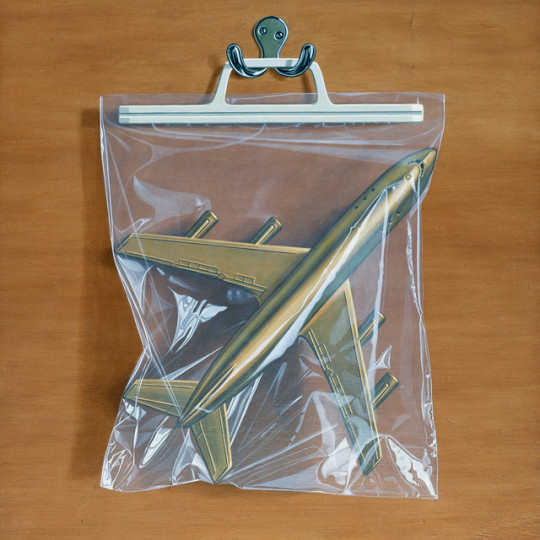
[I made this little text because I felt like writing something about this album, since I still think about it and listen to it a lot, to this day. Hope you enjoy.]
cw: toxic relationship dynamics, blood, weight-loss mention, drowning mention, cancer mention
To a lot of people, there's an undeniable pull to giving. The idea of committing to something - or somebody - greater than one's self is alluring to many. And in commitment of that kind, to give is normal; giving money, giving time, giving attention, giving possessions.
When we truly believe in something - or somebody - and want the object of our adoration to thrive, we'll give our hearts' contents away.
...To a lot of people, there's an undeniable pull to receiving gifts.
The contradiction is obvious, as is the problem - giving is finite, and receiving is infinite.
Black Country, New Road's sophomore effort "Ants From Up There" tells of a doomed situation like that. The Concorde Fallacy, named after the multinational Concorde agreement (more commonly known as the sunk cost fallacy) is primarily used in economics, but slots perfectly into place with the mental and physical drain of a painful, struggling relationship that flies using only one insidious fuel: Commitment.
Human beings can be addicting; when their favour is hard-won, it's all the sweeter when you do get it. It doesn't matter if the person you loved has categorically ignored you when you asked for their attention, belittled you and your boundaries, taken what you had until you were lacking, hurt you - If they smile at you, it's worth it. If they compliment you, suddenly, it's worth it. If they fuck you, it's worth it.
And you don't even see the tear-stained pillowcases in the wash; you don't notice your health declining, the weight you lose; you don't understand your friends telling you that the relationship is bad for you, because surely, “who I put this much care into must care too, right - right!?” All these warnings dissolve into an ambient buzz, background radiation; they become a hurt so familiar it grows unquestioned.
The song “Concorde” says it a little like this: You wouldn't even notice the relationship was killing you if it was a cancerous growth, diagnosed by a doctor.
Human inertia dictates to keep doing what you've been doing. To keep worshiping at their altar, and, in the small gestures that are oh-so meaningful to you, be rewarded.
"Ants From Up There" showcases this short-circuit in the human mind with an arresting amount of immediacy, intimacy and nuance. It even acknowledges the most horrible part of it all:
You do it to yourself.
People can only walk over your boundaries if they’re violent - or - if you let them; and having trusted somebody who, at the time, you thought you had every reason to trust, can feel like your own mistake.
The muddiness of emotional truth is hard to divide apart - “Ants From Up There” doesn’t try to do so, but instead, pits one side of the relationship - the giver - entirely against himself. The album’s protagonist, Isaac (whose story, while likely autobiographical, I’ll treat as fictional so as to not analyse real people) is filled with self-loathing both over perceived personal inadequacies, chambered in a gun’s barrel pointed at himself, and a clear belief that his commitment to the other person - who’s nicknamed “Concorde” throughout the album - gives his impossible soul some kind of purpose, elevates him by virtue of his servitude of her ghastly better-ness.
When you treat a human being as better, as an object of worship, you're likely to be seen as an object in return: As useful, and disposable. The song “Good Will Hunting” examines this most closely, with a short parable of a hull breach on a starship, with “Concorde” taking the only escape-pod and filling it with things most important to her - leaving Isaac, the disposable, behind.
Isaac also believes that he, himself, is helpless - and to an extent, he becomes it, as he spends all energy he used to spare for self-care on caring for his relationship instead. In “The Place Where He Inserted The Blade”, Isaac not only fails to understand how to cook a simple meal after a recipe out of his interdependency on his partner’s approval and praise, but, on the metaphorical side, where and how he was hurt, what actually happened.
“Good morning - Show me the place where he inserted the blade!”
Notably, he speaks of a “he”, rather than a “she”. Until the very final moments of the album, Isaac is incapable of conceiving that “Concorde” was capable of hurting him; he instead seeks the blame within.
—
Sometimes, I wonder if people on the final flight of the Concorde were sad. About the end of an era, or the end of a peace-project between several nations; the end of a commitment. In retrospect, I assume they probably weren’t - it was just a flight like any other, standard procedure. And after all, they were just passengers. Bystanders.
Maybe, the flight would have been more notable if it had ended with a crash.
Many relationships like the one portrayed in this album exist. They’re a dime-a-dozen, many people take too much, and many people give more than they can; and in some way, “Ants From Up There” seems painfully aware of this. It balances it out through this intense specificity and an emotional rawness that few - maybe no - other albums released in 2022 can match. And through being specific while simultaneously aware of the commonness of its story - interspersing more direct allusions to Isaac and “Concorde’s” relationship with abstract pieces about similarly-shaped situations between unnamed characters - it invites the listener in. It allows them to examine themselves in relation to that hurt.
There isn’t much to learn from “Ants From Up There”; it’s a tragedy. Though written in present tense, it’s been played, recorded, and pressed to physical media; it’s a done affair. Isaac’s life was forever changed by “Concorde”, and though he comes to the realisation of the magnitude of this hurt in the closing minutes of the finale “Basketball Shoes”, and purports some small manner of internal healing earlier in that song, for us, there’s nothing to do but feel for Isaac, and, in the way that his struggles mirror our own, be cleansed.
“Oh, your generous loan to me - Your crippling interest!”
Isaac screams this, tears pouring down his face, closing the album. To the last moment, even knowing his hurt, he feels he has taken from her, not that he was exploited. The name Isaac means “the one who laughs” in Hebrew; an irony like that is stronger than fiction.
If a lesson must be extrapolated for all this hurt to be worth something, I suppose it’s this:
No matter the heights of your altruistic love, no matter the depths of your self-loathing, eventually, you have to stop pouring from an empty heart, or drown in your own blood.
44 notes
·
View notes
Text
Actually, want to return to this post real quick because people are now reblogging to agree with the inane addition, but I want folks to know that when you’re making an argument of literary analysis, “what I want to happen” is not valid evidence. “Well nobody in Mu Qing’s life died except for his dad, so him being passionate about committing war crimes must be because his dad got punished for saving people!” Literally nowhere in the book is Mu Qing’s father’s execution relevant except to say why people discriminated against Mu Qing. Mu Qing’s father is never brought up outside of that, not by Mu Qing or the narration, and it is mentioned once in a throwaway line. “Mu Qing’s father, the fallen hero” is a headcanon, not evidence for character analysis.
What we actually see in the story is Mu Qing, in his care for Xie Lian, saying that Xie Lian’s (and the people of the capital’s) lives are more valuable than the people of Yong’an who they are fighting. We see this reiteration before the flashback reveal when Mu Qing says that soldiers of one country should not worry about the safety of the civilians in another that get caught in the crossfire of their war. We see it again in the flashback with the one cup of water scenario. You do not need to headcanon some convoluted explanation for why Mu Qing would possibly think genocide is ok when the story makes it pretty clear that he and other characters place intrinsic value upon people they decide are “of status” that they do not apply to others. This is literally just in-group/out-group mentality.
On another note, 1) people get executed for more than just treason, past and present (and in fiction, since this is a fictional story not set in a real place or time), 2) using Xie Lian’s Central Plains General story to say that Mu Qing’s dad must have gotten executed “for treason” because “he was helping people” makes absolutely no sense when you consider the fact that Xie Lian, himself, didn’t get executed for helping people, either, 3) if his dad’s execution is what made Mu Qing forsake caring about people and promote genocide, then guess what? He’s still a shit person promoting genocide! You just made it worse because now, he’s promoting genocide to spit on the legacy of his own father! So now we’ve circled back around to: Mu Qing is not a working-class hero because he does not value people below him.
Mxtx said that we shouldn’t take the words of the general population and especially not the rich and powerful at face value when they unite to spread certain narratives, that we should find the truth by looking at the actual facts and the characters of the people involved to discern the truth. What she did not say is that if we don’t like the picture the evidence presents because it makes our favs look bad, then we should make up evidence of our own in disregard of the truth.
#tgcf#caught a glimpse of some bullshit#and now I’m glad I didn’t actually read that whole thing#mu qing’s dad don’t even got a name; that’s how irrelevant he is in the story#but now you dragging daddy mu’s name through the mud in defense of MU QING???#if y’all don’t let that man rest in peace
78 notes
·
View notes
Text
I wanted to make a big-ass analisys on Tai, but I kinda don't feel like it. Have a summary instead.
In a few words, I think people on both sides are taking a very complex situation and giving it a black or white interpretation, which doesn't sit right with me.
My opinion, explained as simple as possible, is that Tai has been a bad and neglective parent not for lack of love, but for lack of ability in the given circumstances. He was a broken man who did the best he could, and still badly hurt his daughters in the process, sometimes by making terrible mistakes.
Taiyang was absent and Yang took over as the caretaker role for her baby sister, and that's not good for a child. That is indeed a textbook parentification case, which very often do take place when one parent passes away and the other is frozen by grief, but I wouldn't consider this a case of abuse as well.
Abuse to be called that has to be pretty extreme and consistent for a long time (honestly, internet is ruining the word by using it every time someone makes a mistake or when your friend treats you badly once), and let's be honest: we don't know how long Taiyang has been shut down. Yang doesn't specify it in Burning the Candle, nor is it ever mentioned by writers or such (at least to my knowledge). Considering what we saw of the relationship he has with his daughters though, I'd argue that it wasn't for the long time that people believe and that he stepped up at some point (I'm pretty sure their relationship would be much more ostile if he didn't).
"Why does Ruby say that Yang raised her then?" because she already had formed an attachment to Yang as parental figure. You can have multiple attachments as a child of course, but that also means that Yang simply couldn't step down from that role, even with Taiyang being back, because Ruby kept treating her like one (that's not to blame on Ruby of course, it was a natural response from her).
Now, let's not forget about intentions: it is true that abuse isn't always made with conscious ill-intent, but it's also true that not all forms of hurting are abuse. Considering everything from the little we know, I'd say Tai falls more into the neglect category, which can but doesn't always allign to the point of abuse (see again the point about consistency).
That's what I think but, truth to be told, none of us has enough information to make a proper analysis or statement. It is a very complex matter that in real life would require a deep study/analysis and lots of therapy sessions. Meanwhile Tai is a fictional character we barely see in the show he's a part of.
It is fine to speculate and discuss (in a civil manner please) and share our opinions. I'm not expecting everyone to agree with me or text me about how I changed their minds; I just wanted to share my opinion. But let's not pretend that there's some sort of real final answer or interpretation when we get so little to work with. Maybe not even the writers know clearly, and just had his character as a tool, who knows!
Maybe some day we'll get more information that will make me go "damn, I was completely wrong!", o maybe not. Honestly, I don't particularly care. But I'd like for people to chill, stop treating this as a trial, and recognize that different interpretations from different people with different experiences and backgrounds aren't a bad thing.
#should i tag discourse?#let me know#for a summary it still came out pretty long#but it could have been worse#you have no idea how much stuff i got from my major lmao#i could have pulled out so many examples and course of actions that are used in real life#anyway don't be rude please#It's fine to disagree#It's not that big of a deal
32 notes
·
View notes
Text
Simple facts about Ancient Egypt (2)
Last time, we talked about generalities - history, geography, pharaohs, government... Today, let’s look at some of the main social classes and jobs in Ancient Egypt!
As I said before - warning, these are oversimplified and general facts for a short and easy introduction and comprehension to Ancient Egypt. These are not in-depths studies or analysis, and I might have gotten things wrong, so beware!
SCRIBES
# Scribes, from the Latin “scribere” (to write) were public writers: they were tasked with redacting administrative documents, with the job of accountants of the State, but they were also tasked with writing things such as letters, poems or fictional tales. The job of a scribe went from father to son, and every future scribe had to undergo a very strict and difficult apprenticeship. To be a scribe was a very envied position, for it was a privilege given only to boys – and to the wealthiest of boys! The material of the scribe was quite simple, all contained in a wooden case: there was just a reed pen, and two blocks of ink, one red and one black – to write, the scribe plunged the tip of his reed pen into water, and then rubbed it against either the black or red ink-block.
# Because ink was we know it today didn’t exist back then in Egypt – their “ink” was actually blocks of compact powder. Black ink was created with soot or crushed coal, whereas red ink was created with ochre. Similarly, the Ancient Egyptians did not write on paper but on papyrus – a type of material that shared its name with the type of Nile-reed it was created from. (Fun fact, the name “paper” does come from “papyrus”). Creating papyrus was done by cutting and peeling the papyrus-reed into thin slices, that were then gorged with water, placed in crosses layered on top of each other, and then brutally hit with a hammer until it became one uniformed page (the sap of the reed and the water fused together to form a sort of “glue” holding the stripes together). Finally, the page was thinned down, and smoothed with wooden items.
# Papyrus was however very costly. So, to not lose all of one’s money, Ancient Egyptians wrote for every day needs on pottery fragments or wooden planks covered in plaster. Pupils in schools for example wrote on broken pieces of bowls or vases. The papyrus, so precious, was kept exclusively for law texts and religious texts. To create 5 scrolls of papyrus, of roughly 10 meters each, a man had to work for a whole year!
# Most scribes worked for the government: one of their job was to do note down the state and quantity of the harvests each year before calculating the taxes based on the amount of harvest. They were also the accountants of the state, as well as the ones charged with writing down the laws and the orders of ministers. Other scribes rather worked for temples, where they engraved magical incantations on amulets ; and a third group acted as clerks in tribunals.
# Learning to become a scribe might look easy, since what you need to do was just copy texts all day long… But in truth it was a very hard thing! Our alphabet only has two dozen letters or so – the Egyptian scribes had to learn thousands of different signs to write down the texts, and they had to learn how to write them on every material possible. If you wanted to be a scribe, you had to go a “scribe school” – pupils usually went there are the age of ten, and left at fifteen. After these five years of studies, the scribes had to undergo an internship of five years in either the administration, in a temple or with a notary. After this internship, would-be-scribes had a final exam – and it was only then they could become certified and testified scribes, at twenty years old. Scribe school was notably a very harsh and unpleasant place – a common saying among scribe teachers was “Students have ears in the back, and these ears only listen when you hit them”. Yes, corporal punishment was a standard method of teaching in these schools – if students didn’t pay attention, spoke with each other instead of copying their texts, or wrote a hieroglyph wrong, they were immediately beaten up with a stick. In fact, to prevent the students of scribe schools from leaving unsupervised, the teachers attached to their ankles wooden blocks! Yes, just like the cartoon prisoner with the iron ball around their ankle!
# All scientists were scribes, but not all scribes were scientists (or scholars). You see, to become a scientist or a scholar you had to learn how to write and read – and to do that, you needed to become a scribe. But many scribes stopped there and did not pursue their studies further – only some decided to take on a specific field of expertise (medicine, architecture, astronomy) and thus became more than just “regular” scribes.
# Scribes wrote their text in a very specific way. They sat cross-legged on the ground, placed the papyrus they wrote on their loincloth – that was pushed by their knee very strongly on each side, so it would be a flat surface to write onto. Scribes also wrote with their pen standing up, very still – so that they wouldn’t do any stain or mess up a line, because their ink took a very long time to dry.
# Scribes were the object of admiration, but also jealousy, from the everyday ordinary Egyptian man, because scribes were very well paid AND were exempt of taxes. Plus, their work was a non-manual one, unlike the other Egyptian men who were peasants or craftsmen. This was notably why in Egyptian art scribes are always depicted with a potbelly or fat rolls – thanks to their wealth and effortless job that demanded them to sit around all day, they were the only inhabitants of Ancient Egypt who could easily become fat. In return, the scribes themselves were very proud of their position and status – and this often made them quite arrogant, according to the ancient texts. One of the favorite entertainments of the scribes was to mock other jobs or workforces of Egypt by telling funny stories or jokes about them.
PRIESTS
# Do not get things wrong: in Egyptian religion, only the pharaoh can act as an intermediary between the gods and men – he is the true voice and right hand of the gods. But then, you’ll ask, why are there priests? Well it is simply because the pharaoh is one human man, and cannot be everywhere in the country – so the pharaoh delegates his powers to the priests, who act in his name. This is something important to remember: Ancient Egypt was a form of theocracy, and the priests did not get their power from the gods but from the pharaoh. Though the priests’ role WAS to serve the gods. Ancient Egyptians and Ancient Egyptian gods had a deal worked out: the priests would tend to their need, and take care of them, through various festive celebrations and everyday rituals, and in exchanged from being tended to, the gods ensured the protection and wellness of the city/region/country they were worshiped in. As easy as that. But this explains why for example priests were not depicted on murals or paintings of temples: priests were not perceived as worthy of being depicted alongside the gods, because in the Egyptian mindset, priests are just servants – or rather some sort of religious bureaucrats. Only the pharaoh, the one and true emissary of the god, and himself equal to the gods, could be painted on the walls of temples.
# The role of priests, just like the one of scribe, usually was passed from father to son. Usually priests began their apprenticeship as children, studying at the school and at the library of the temple alongside scribes. Given being a priest was a very prestigious function (again, quite like scribes), some people rather could buy a priest job with a heavy sum of money, or it could be given by the pharaoh himself as a reward, to those that served him well and faithfully.
# In every great temple and religious center of Egypt there was, at the top of the priestly hierarchy, a great priest, or “first prophet”, named directly and personally by the pharaoh. This great priest held authority over all of the other priests, and also played a political role in the city he was in charge of. Below him came the “divine fathers”, important priests that took care of the rituals and walked in front of their god’s statue during processions. Finally, at the bottom of the hierarchy, there were the “purified ones”, whose job was to carry the god’s statue during procession, to clean up the temple every day, and to do all the chores. Speaking of cleanliness, being pure was a very big deal for Ancient Egyptian priests – they usually took four baths a day in the lake’s temple, or rather two baths during the day and two baths during the night. It was a way for them to stay “pure”.
# Priests had a LOT of work and so, to be able to rest and not die of exhaustion, there were “teams” of priests formed in temples. Each team was to work in the temple during one month while the other went to live into town, and after one month a new team went in. In smallest temple there were only two teams, each doing half of the year, but in the biggest temple, there could be up to four priest teams. And since the priests were to live in the town quite regularly, and couldn’t possibly live alone (for Egyptians a man couldn’t just live all on his own, it was not a good or healthy lifestyle), the priests were allowed and even encouraged to marry, so that when leaving the temple they could have a wife and children to return to – children that in turn would become priests once their father grew too old.
PEASANTS
# Peasants formed the bulk of the Egyptian population, and they were a key part in the wealth of the nation: without them and their constant toil, Egypt couldn’t have existed. But despite their immense utility, priests were very poor and not respected, forming the lower rank of the social hierarchy. Most of them acted like serfs, in service of great landowners, temples, or the ministers of the pharaoh. The comparison to serfs is quite relevant as, just like serfs, Egyptian peasants did not own their lands, and they could be sold just alongside the land they were dependent.
# The fields of the peasants were actually really small, roughly the size of a vegetable garden today. They were delimited by big and heavy rocks – every year, bureaucrats of the realm checked after each flood is these rocks hadn’t been move. The peasants also had to swear an oath to never move secretly the stones to augment their field – if they were caught doing that and lying about it, they had their two ears cut off!
# Scribes went three times a year into every peasant’s home. A first time to measure their field, a second time once the cereals ha d grown – to evaluate the harvest and calculate future taxes based on this hypothetical harvest – and a third time during the harvesting, to collect the taxes. Of course, on this third visit, scribes were escorted by armed soldiers. If a peasant refused to pay the taxes, he was beaten up, and/or his house and tools were taken away from him – sometimes he was even thrown into prison. According to some tales, the most extreme cases of punishment had peasants that did not pay their taxes being beaten up, tied with a rope, and thrown at the bottom of a well in front of his wife and children – who in turn were imprisoned in his place! Better pay the taxes the, you say? Well, the problem was that the taxes were calculated during January, two to three months before the actual harvest. If any sort of disaster happened, and they lost their harvest, they still had to pay the taxes as if they had a full harvest…
# No need to tell you that the peasants’ worst enemy (outside of the locust) was the hippopotamus! Hippopotami were considered a true disaster, since in a single night, a hungry hippo could eat up to sixty kilos of plants (132 pounds). If a small group of hippos came by a field in the night, in the morning nothing was left… So peasants hunted and killed hippos without pity or mercy.
CRAFTSMEN
# Craftsmen were the middle-class of Egypt, coming below the scribes and bureaucrats, but above peasants. Craftsmen worked numerous types of material: stone, wood, iron, precious metals (such as gold), leather, textiles and glass. Craftsmen never worked alone – they were always forming groups and teams, part of workshops financed by the government, or by a temple, or by a rich family. Each workshop gathered various specialists – a carpenter, a painter, a smith, a jeweler, a stone-sculptor…
# The quality of a furniture could be identified by the type of wood used: good quality furniture was done by sculpting cedar, a tree that was important from the Lebanon. High quality furniture was also often decorated with ivory or ebony. Lower quality furniture however, was usually sculpted in sycamore trees or palm trees – a wood so friable they were often covered in plaster to just be able to stand up and hold any kind of weight!
# The Egyptians discovered how to make class towards 1500 BCE. They created it with sand, salt, and they always colored their glass with metallic pigments – an Egyptian would have never created a transparent piece of glass. Egyptians loved colors, and so their glass work was always red, blue or yellow.
# Potters were considered to be “different” from other craftsmen. More specifically they were thought to practice a very “common” craft. Scribes liked to mock them by describing them as dirty, and always covered in mud. Potters did not work in the royally-sponsored workshops I described above – they rather worked all alone, for their own. They built most of everyday objects: vases, plates, cups, jars… Potters usually worked with the clay of the Nile, sculpted by hand (at first, then the potter’s wheel was invented), and then left to dry up in the sun before being “cooked” in an oven. Their other technique was to create a material by mixing sand with water, salt, ashes and lime – this substance was then placed inside molds, and placed in an ove.
# Pearls in Ancient Egypt are a fascinating thing, because Egyptians did not know about the existence of oysters – or if they did, they couldn’t access any of them. So, Egyptians created their own pearls, by polishing stones so much they were reduced to very small spheres, that were then pierced to be placed onto necklaces.
# All the gems and precious stones used by Egyptians (the red carnelian, the purple amethyst, the turquoise and the blue agate – plus gold of course) were extracted from mines located in the desert, and in which criminals and law-breakers were sent to work (because working in these mines often killed the miners). The favorite gem of the Egyptians, the lapis-lazuli, was rather important from where today’s Afghanistan is located. However, faience/earthenware was very common among Egyptians precisely because with its blue-green color it could look like emeralds or turquoises, while being much MUCH less costly. This is why there were a lot of faience jewels in Ancient Egypt – they were basically for those who wanted to look good without having the means to.
#ancient egypt#scribes#peasants#egyptian religion#egyptian priests#ancient egyptian crafts#craftsmen#ancient egyptian society
17 notes
·
View notes
Text
a disorganized analysis/thinkpiece on danganronpa v3's ending
also known as: why drv3's ending was not the shitshow people think it is and what we can learn from its implications. spoilers under the cut (obviously).
i really do think that v3 was the best place to end the series on. to me it feels like some very poignant commentary on seasonal rot, fan reception, and the role of creatives in pop culture. like... in-game, danganronpa was in its 53rd iteration. there's no doubt that plenty of plot points were repeated over and over and over again— namely the continual reappearance of junko. "it's always junko enoshima", tsumugi says. and she's right. the shadow of junko enoshima looms over the entire franchise. she's omnipresent, seeping through every writing choice and plot beat for her brand recognition. i can only imagine that the writers behind the show in-game (and perhaps irl) were growing tired of having to do the same thing every single time.
the truth is, you can't keep a franchise going without it eventually growing stale in some way. all things must end eventually, no matter how great they are. and truthfully, so much of our media landscape is permeated by the same exact franchises, the same exact games, the same exact shows and movies. think for a moment about, say, games like final fantasy xiv and genshin impact (both of which i adore, to be clear). both games will eventually reach a natural end point, but i must admit that i fear the inevitable prolonging of both because they're popular and profitable. games such as MMOs and live service gachas are not sustainable forever. you can't expect creatives to seriously want to keep working on the exact same story their entire life. that's not even mentioning, say, the marvel cinematic universe or supernatural, with both franchises reaching a good place to end and then just... not.
that's the kind of thing that drv3 was trying to comment on. and frankly, the fan reception to that callout only further proved its point. i've been in the dr fandom since 2013 and was around for v3's initial release. people were furious at the ending— downright spiteful, i might add! after all, they weren't happy that the series they loved was so cynically turned on them! and while i can't blame anyone for being upset at that, i can blame those who did not critically look at themselves and the series, and only demanded more and more of the franchise. frankly, if dr had continued past v3, i don't think it would have been all that interesting or well-written. kodaka's already moved onto new projects, so why can't we? because we're so attached to fiction in the same way that tsumugi is, clinging to what's familiar and never branching out? valuing what isn't real over our own lives and well-being?
the truth of the matter is, everything ends. stories, events, good times, bad times, life itself. but the end to anything can be the beginning of another. and shouldn't life be full of wonderful, varied experiences?
and if we have to keep junko twelve feet under to do so, then i think it's worth it.
6 notes
·
View notes
Text
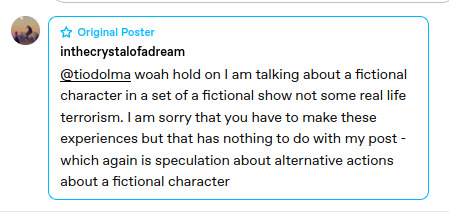
@inthecrystalofadream and i think this is what morgana analysis from a lot of merlin fandom lacks. Here I employ YMMV "your mileage may vary"
I get that we probably didnt grow up in the same circumstances. Hence why I can offer analysis like this of a very fictional character in response to your meta as someone who grew up in an environment that tbh isnt very different from Adventures of Merlin's Camelot. This is all very watsonian(in-universe) of us after all, so i implore you not to ignore what i can see for myself in bbc morgana's characterization.
Hear me out.
BBC Merlin writers were not stupid. They knew where to draw inspiration from. BBC Morgana, unlike arthurian legends Morgan la fey, was actually given by the writers a justified cause for her "evilness" or "extremism." She came from a place which wanted justice for herself and others members of a minority group and was continuously left with no choice but to go on the offensive. Why do I know this?
From this interview Katie Mcgrath dropped a very very interesting tidbit about Morgana's characterization
BTW, I used to think like you guys you know? Why couldn't Morgana just make a new kingdom? Why didnt she just started healing people out of the blue? Why wouldn't she convince uther when they are so close?
UNTIL THIS I READ THIS FROM KATIE MCGRATH HERSELF
“One thing I was told to remember was that you cannot underestimate the impact of spending a year with someone like Morgause … who she sees as the only person to ever accept her,” Katie explained, when asked about Morgana’s quick and brutal turn against everyone in Camelot
THIS SLAPPED ME IN THE FACE. You know what this reminded me? It reminded me of the "Save Our Children" Campaign my government used to propagate many years ago at the height of President Duterte's power. For context... Activism is basically discouraged in my "Democratic country." (ironic i know and thats why this propaganda was dangerous)
In this campaign the mothers of activists (who are now rebels) lamented at how their children/ young adult kids left home for montsh on end to train in the mountains and how they came back totally changed.
All the meta about "there is no way morgana would change in just one year! she must be darktowered and enchanted!" suddenly lost steam for me. I had forgotten an important truth in my own real life experience: THAT People, especially ambitious young adults full of hope and idealism, can get radicalised and turn to extremists in just 3-6 months by being thoroughly isolated from their peers and fed grandiose promises of new world orders and knowledge of information and offensive/militaristic skills.
You do not need magic to convince people to turn away from their original selves. You just need a skill of words and a show of belonging, community, knowledge, power and opportunity. AND 1 YEAR IN ISOLATION OF THAT? OH BOY. You got a well trained revolutionist and agent already.
I thoroughly believe that this is what happened with Morgana. Because Katie talked about her like that in that interview. In another interview she even said "Morgana was duped by Morgause"^^^
This is the analysis i have chosen to understand morgana. This is what I offer in this fandom. Because I come from a place most likely unlike yours but quite similar to BBC Merlin's in spirit.
There is another way to look at Morgana's character and that is to look at her in the eyes of a powerful political activist and A REBEL who was pushed to the extreme and yet not allowed to experience proper negotiation/diplomacy even when she asked for it.
Just think about it. Don't shut these kind of meta out for being disturbingly close to life for other fans. Our Mileage May Vary.
#bbc morgana#if u dont notice here activism is demonized in my country#u have to understand why i can analyse morgana like this#and pls open your mind#ymmv#it has everything to do with ur post tho#u said “side with merlin” and also “evil”#those are politics codewords already#morgana's struggle was political#also if u havent notied merlin is the same
2 notes
·
View notes
Text
collected quotes as a vignette on thinking and the liberatory act
doubt as the foundation of thinking:
“A minimum of unconsciousness is necessary if one wants to stay inside history. To act is one thing; to know one is acting is another. When lucidity invests the action, insinuates itself into it, action is undone and, with it, prejudice, whose function consists, precisely, in subordinating, in enslaving consciousness to action. The man* who unmasks his fictions renounces his own resources and, in a sense, himself. Consequently, he will accept other fictions which will deny him, since they will not have cropped up from his own depths. No man concerned with his equilibrium may exceed a certain degree of lucidity and analysis. How much more this applies to a civilization, which vacillates as soon as it exposes the errors which permitted its growth and its luster, as soon as it calls into question its own truths!”
- EM Cioran
importance of curiosity as a framework of doubt:
“William James used to preach the “will to believe.” For my part, I should wish to preach the “will to doubt.” None of our beliefs are quite true; all have at least a penumbra of vagueness and error. The methods of increasing the degree of truth in our beliefs are well known; they consist in hearing all sides, trying to ascertain all the relevant facts, controlling our own bias by discussion with people who have the opposite bias, and cultivating a readiness to discard any hypothesis which has proved inadequate”
“Every man of science whose outlook is truly scientific is ready to admit that what passes for scientific knowledge at the moment is sure to require correction with the progress of discovery; nevertheless, it is near enough to the truth to serve for most practical purposes, though not for all. In science, where alone something approximating to genuine knowledge is to be found, men’s attitude is tentative and full of doubt.”
“A great deal of this [will to believe rather than the will to find out] is due to the inherent irrationality and credulity of average human nature. But this seed of intellectual original sin is nourished and fostered by other agencies, among which three play the chief part — namely, education, propaganda, and economic pressure.”
- Bertrand Russell
doubt and curiosity as exercise in liberation:
“Most people, in most places, in most times, are of inferior status.”
“And most people, even now, even in “the free world,” even in “the home of the free,” consider this state of affairs, or certain elements of it, as natural, necessary, and unchangeable. They hold it to be the way it has always been and therefore the way it must be. This may be conviction or it may be ignorance; often it is both. Over the centuries, most people of inferior status have had no way of knowing that any other way of ordering society has existed or could exist — that change is possible. Only those of superior status have ever known enough to know that; and it is their power and privilege that would be at stake if the order of things were changed.”
“The exercise of imagination is dangerous to those who profit from the way things are because it has the power to show that the way things are is not permanent, not universal, not necessary. Having that real though limited power to put established institutions into question, imaginative literature has also the responsibility of power. The storyteller is the truthteller.”
“We will not know our own injustice if we cannot imagine justice. We will not be free if we do not imagine freedom. We cannot demand that anyone try to attain justice and freedom who has not had a chance to imagine them as attainable.”
- Ursula K. Le Guin
the role of knowing ourselves:
“Anyone who has ever been compelled to think about it — anyone, for example, who has ever been in love — knows that the one face that one can never see is one’s own face. One’s lover — or one’s brother, or one’s enemy — sees the face you wear, and this face can elicit the most extraordinary reactions. We do the things we do and feel what we feel essentially because we must — we are responsible for our actions, but we rarely understand them. It goes without saying, I believe, that if we understood ourselves better, we would damage ourselves less. But the barrier between oneself and one’s knowledge of oneself is high indeed. There are so many things one would rather not know! We become social creatures because we cannot live any other way.
“But in order to become social, there are a great many other things that we must not become, and we are frightened, all of us, of these forces within us that perpetually menace our precarious security. Yet the forces are there: we cannot will them away. All we can do is learn to live with them. And we cannot learn this unless we are willing to tell the truth about ourselves, and the truth about us is always at variance with what we wish to be. The human effort is to bring these two realities into a relationship resembling reconciliation.”
In the same way that to become a social human being one modifies and suppresses and, ultimately, without great courage, lies to oneself about all one’s interior, uncharted chaos, so have we, as a nation, modified or suppressed and lied about all the darker forces in our history.”
“Societies never know it, but the war of an artist with his society is a lover’s war, and he does, at his best, what lovers do, which is to reveal the beloved to himself and, with that revelation, to make freedom real.”
- James Baldwin
0 notes
Text
Is Fake News Fiction?
We used to only have three primary news sources, newspapers, magazines, and television. Now we have endless data sources, analysis, and distribution platforms. A significant amount of raw data now comes from ordinary people posting articles and videos on social media. What happens when one or more sources bend the truth? This trend is called “fake news,” which has become a big problem in our society.
Fake news occurs because somebody wants to spin raw data or invent false data to suit their addenda. In the past, this partially happened when the owners of a news source wanted to alter the truth slightly. For example, they might favor famous person X. Their reporters would write glowing stories about X and exclude adverse facts. However, the stories rarely contained lies because the news corporations feared lawsuits.
Now, anybody can post a lie, and millions absorb this “fact.” The fear of a lawsuit is no longer present (it is still a possibility but mindlessly ignored). Plus, many anonymous sites and methods of hiding one’s identity exist.
I recall the first time I read a fake news story. In 1990, a big part of the internet was UseNet. There, people could post, read or reply to all kinds of information, opinions, or satire. I posted a few times, and here is one funny example:
The UseNet thread I followed the most was about the Amiga computer. I read every post for the latest news, tips, information, and help. While I enjoyed my Amiga experience, not everybody was happy about this impressive computer revolution.
One guy’s mother purchased an Amiga, and he was furious that she was not using a Macintosh. So, he posted all the time about the computer’s failings. Because that UseNet thread had no moderator, he could not be banned.
One day, I read a terrible news post. Commodore (the company that developed the Amiga computer) filed for bankruptcy. The post contained a copy of their press release. What dreadful news! But then users discovered this “news” was untrue and posted angry comments about the guy. I was happy and angry when I learned the bankruptcy notice was fake. How could somebody do such a terrible thing? Side note: Commodore filed for bankruptcy in April 1994.
What is it like to write a fake news article? I thought exploring and comparing the process to writing an entertaining story would be interesting. Let’s pretend I dislike the famous person Sally. Here is a Facebook post to discredit her. “Hey, everybody. Big reveal. I hacked into Sally’s computer and found this email: ‘Today, I was driving to work stoned out of my mind. Completely baked. I almost hit a woman pushing her stroller. It was so fun!’ This email confirms what we all suspected. Sally is a pothead. Please send this important news to all your friends.”
This quick post might become popular, and Sally would have difficulty proving her innocence. However, that is not quite the topic I wanted to explore. Instead, I want to compare the mindset of a fictional author and a fake news poster.
Why do fictional writers create content? They wish to explore their ideas, develop new skills, express themselves, share their story, or make money.
How does an author begin the process? My origin story is probably unusual. I had been daydreaming about stories for years, and in 2016, I wrote them down. Now, my stories have more structure because I use outlines. Yet, many authors jump into their stories without a firm plot or take elements from many places and stitch them together.
The goal of a fiction author is to create something that people enjoy. This process includes keeping the reader in mind as they write. Is this a good character? If I add a plot twist, will it be more exciting? This section is dull. This paragraph is confusing.
Creating fake news requires a different approach because the goal is to damage or overcome a truth. For example, “Sally is a horrible woman.” “X political party is better than Y.” “Z is what happened.”
The process begins with a malcontent (Noun. A person who is chronically discontented or dissatisfied.) (I know this because I could not spell the word correctly and had to look it up.) evaluating the best approach. This calculated effort identifies the best attack method or weakness to exploit.
In the above example, I wrote a fake email intending to harm Sally. However, if I wished to uplift someone or something illicitly, I could invent a fake fact: “The Army awarded Sally the silver star.”
What is going on in the mind of a fake news writer? The focus would be to develop something that sounds realistic and does as much damage as possible. In my example, I wrote, “It was so fun.” That is a nice added touch showing that Sally enjoyed being out of control.
It took creativity to develop that sentence, but did the fake news writer use the same mental tools as a fictional author? For example, an author could create a fictional story with a woman driving her car while on drugs.
In writing about this topic, I ran into a problem. I could not answer, “Is writing fake news different from writing entertainment?” So, I took a walk and decided to write a fake news story while considering the process.
To begin, I thought about an actual politician, I never met but did not like. Why this particular person? He has done great harm and is not letting up. This destruction made him a perfect target for me to write a fake news story. I spent 20 minutes crafting a malicious Facebook post. (I am choosing not to include my nasty creation because the world has enough fake news without my additions. Also, this politician is popular, and I do not wish to alienate my readers.)
My fake story was like my Sally example. It began by embellishing my computer skills and explaining how I accessed their computer. Then I described the joy of finding an incriminating email describing a drunk driving near miss.
My effort began with a moral block because I have never tried to harm somebody by spreading a lie. Plus, I knew that if I posted my creation, it was illegal, and I could face a lawsuit. But, to my surprise, this trepidation quickly passed, and I became excited. I invented details and researched creating a fake email header. I even changed the event from drugs to alcohol abuse because it sounded more realistic. Overall, the creative process was exciting, and the danger added to the moment.
When I finished my slander, I was happy. My creation looked real, and if I read it online, I would have swallowed the bait and found another reason to hate this individual.
I then took a step back to examine my mindset. This fun activity was a good outlet for my anger, and I now understand why fake news has become such a plague. Was it creative? Was it the same as writing a book? I conclude that writing fake news is two sides to the same coin. I was creative and required the same skills as writing a book. The process was like writing dialog for a villain with pride in their destructive actions.
This revelation should not have come as a surprise because our brains have limited functions. There are no separate parts for creating fiction or fake news. It all comes from the same well. Yet, I was hoping there was a difference. Good writers should be above fake news. It turns out that I was wrong.
Understanding our limits, exploring our minds, and trying new things are essential. I enjoyed this learning experience, and, like all good ones, the results were unexpected.
You’re the best -Bill
May 24, 2023
Hey book lovers, I published three. Please check them out!
Interviewing Immortality is a psychological thriller about a 500-year-old woman who forces a disgraced author to interview her.
Pushed to the Edge of Survival is a drama, romance, and science fiction story about two unlikely people surviving a shipwreck and living with the consequences.
Cable Ties is a classic spy novel about two hunters discovering that government communications are being recorded and the ensuing FBI investigation.
These books are available in soft-cover on Amazon and eBook format everywhere.
0 notes
Text
Analysis of the Family Agreste Portrait
Quarantine strikes again and since the Agreste family portrait has fascinated me for a loooong while now I decided to put my thoughts into words and write another essay x3
The amount of informations we get out if it is amazing and its not only highlighting the absolute TRAGEDY it is that this family is about to face such a horrible fall out, it also hints at the former family dynamic before everything went to hell.
So make yourself comfortable and get something to drink, because we will be here for a while.
Here we go: My analysis of this beauty of a fictional portrait
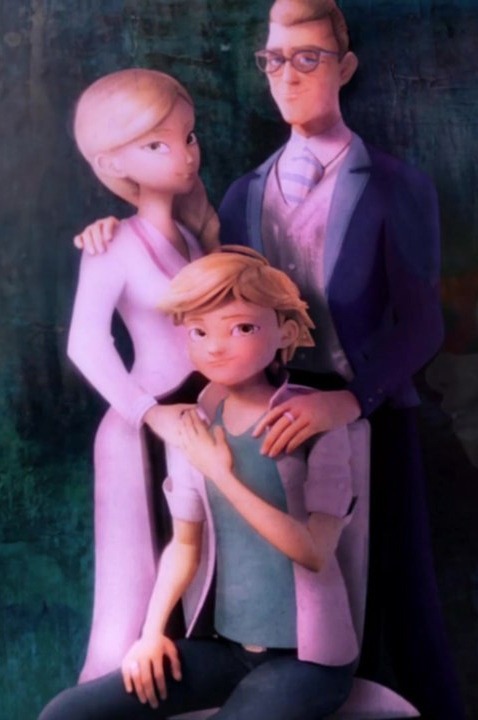
Let's start with the most obvious one: Hawkmoth.

Its commen knowledge by now that the background makes it seem like Hawkmoth is standing behind the Agreste family like a bad omen waiting for fate to take its course and cause their doom. The portrait is brilliantly designed so the illusion is created that Gabriels body (here in a blue suit closer to Hawkmoths normals dark purple one) overlaps with Hawkmoths and a darker line is connecting the two faces as well, which rest on the same height right beside each other. The very same line grows bigger as it goes further behind Emilie - coloring her entire background - showing us that EMILIE is all Gabriel sees when he becomes Hawkmoth. But notice that Adrien on the other hand can hardly be concidered part of Gabriels “sight” at all.
Its forshadowing 101 and damn beautiful if I may say so. But this isnt what I want to focus on in this post.
I want to elaborate on two other key factors that tell us about the former dynamic of the Agrestes instead and what they tell us about the present and future.
The heart:
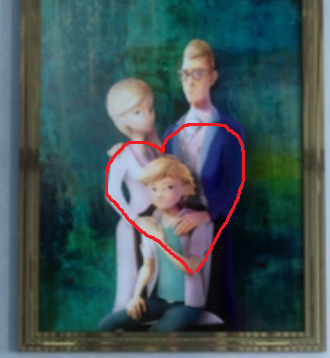
This is hitting me on another level because look at the heart these three form with Adrien right in the middle! He was so LOVED. This family may have never been anywhere close to ideal but still, there was LOVE and now he's gonna loose it all.
Adrien already lost his mother which led to his father getting even more distant and cold and now his father is becoming increasingly more abusive as he falls deeper and deeper into villainy. Gabriel was never a good father, the show has already made this clear with episodes like "the bubbler", “the collector” or "Gigantitan" for example but gosh there was hope for their little family! The end scene in "Jackady" portrayed it perfectly and I wrote a whole other post just covering the sigificants of Adriens and Gabriels hug in that episode. Check it out here if you want, it goes hand in hand with this one.
Miraculous is all about love and the completely different ways it can affect us, our behavior and actions. Because love isnt just wonderful, pure and empowering, it also can be twisted, destructive and cause the darkst nightmares. And with this family the writers know how to portray the complex love in an abusive houshold thats destined to go up in flames and they also know how to hint at their troubled past with the family portrait.
But this heart visual tells us even more in connection with the positions of their hands. And with these two key factors, lets start with Gabriel:
His hands convey it so strongly. He loves/d Emilie and Adrien so much and no doubt this love for them was certainly the reason why he started his quest as Hawkmoth. But he is now losing himself more and more in the pleasure of his villainy to the point where he forgets why he's doing it in the first place and becomes a complete monster (of a father). But this turn and spiraling into villainy didn't came out of nowhere - this root already had to be in him to grow like that. And this is also something the portrait indeed hints at as well.
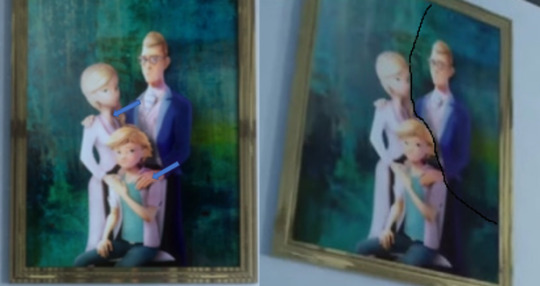
Because Gabriel is the only one of the three who:
1. We see so completely open and without hesitation reach out and hold BOTH his family members.
2. Is visually “cut off” from them as well.
But this doesn't mean he was excluded and the only one who truly cared and loved, it just shows that things were more... complicated...as usual.
This is best explained with Adriens hand placements:
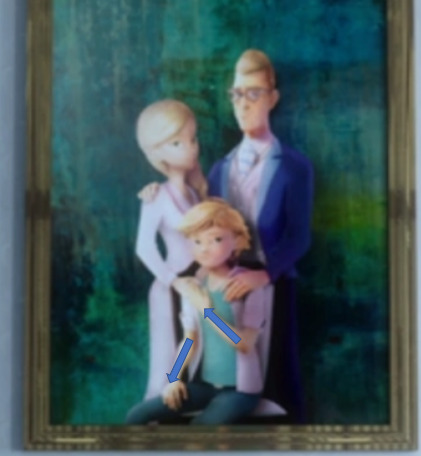
One hand is holding his mothers but the other one is visibly not reaching out for his father. But as we all know, that's not because Adrien doesn't love him. In season 1-3 it is made more than clear that Adrien does not hate his father - he loves him alot and tries to be there for him and be patient because he knows that the loss of his mother brought his father terribly down.
Sure, Adrien gets frustrated and angry with him, literally how could he not?? But Adrien tries his best to reach out to Gabriel so they can bond and come out of this tragedy stronger.
But this loving willingness to forgive his father for the chance of growing a father-son bond with him doesn't change the fact that these two didn't had a bond prior to this. And let's be honest here, does anybody actually think this distance between them was caused by Adrien? I don't think so.

So notice how Adriens hand - not reaching out for his fathers - is the only one in the portrait NOT inside or forming the heart.
When the connection of the hands between the family members symbolise their connection to another, then Adrien keeping the hand for his father away from the display of love is VERY telling. It tells us very directly what this distance did to Adriens side of the relationship. Despite Gabriels hand being right there, Adrien does not meet the gesture. And I cannot believe that he did it out of resentment, nothing in the show indicated such strong negative emotions from past Adrien.
It's much more likely that Adrien not reaching for his fathers hand is meant to show us that Adrien felt that he either CAN'T return the gesture because he fears that it'll end in an unpleasant reaction from Gabriel - that it isn't Adriens "place" to reach out to his busy and distant father like that, like it's demanding something - or Adrien simply didn't took Gabriel laying his hand on his shoulder, in the context of posing for a portrait, as a gesture of love and affection.
The way I interpret the portrait is that prior to Emilies dissappearence Adrien did not exactly try to reach out to his father the same way he did from s1-s3, which, I mean, of course wasn't the case. Not only is it NOT the 13 years olds (or younger) job to form an emotional connection to their absent parent - when that’s the PARENTS job - it also wouldn't be necessarily "needed" for Adrien to do so.

Because Emilie at this point was still in the picture so and she was the complete opposite. She was a (or maybe the ONLY) safe, reliable and loving constant of parental attention, affection and care in his life and because of these two HARSH contrasts Adrien learned from very early on to focus mostly completely on her in that regard while kinda blocking his father out.
That most likely wasn't even an active choice whatsoever - Gabriel proofed to be an unreliable resource so Adrien learned to subconciously treat him that way out of self protection. That doesn't mean he had any kind of dislike or malice against his father it just means that he wasn't able or allowed to connect with Gabriel the way he needed. Several episodes show that Gabriel deadass only parented like 15 minutes tops in his life with one of the worst offenders kinda being “Gigantitan” ngl.
So yeah, when I see that the portrait wants to tell me that prior to Emilies loss, Adrien - a 12-13 year old at most - is THIS used to rely solely on the strong bond he has with his mother and not even really reaching out for his fathers love, then I can't help but interpret it in the way that... Well... Gabriel was so distant and emotionally unreliable to Adrien for all his life, that Gabriel simply... wasn't needed by his son. Not at that point of time at least.
And while this may seem weird, because obviously Adrien only now starts to stop craving for his fathers affection and approval (which is btw a horrible, HORRIBLE thing and not something good. A half orphan losing the last remaining hope he had left of having the chance to finally get to form a bond with the only other parent he has left, just to be crushed by disappointment and abandonment all over again until he let's go, is REALLY NOT as much of a good thing people will make it out to be. This is... plain awful) it's actually quite logical.
Adriens hand outside the heart doesn't mean that his father meant nothing to him and therefore refuses to meet and accept his affection (that's literally the complete opposite of what the show shows us), it means that Adriens and Gabriels father-son relationship suffers from a fatal emotional disconnection caused by miscommunication/ a lack of communication.
And this was caused by Gabriel. How? Let me elaborate on that by going a bit far afield (cuz lbh we all have time for this. I’m writing this in quarantine and youre reading this is quarantine, so lets gooooooooooooo).

In "The bubbler" Adrien says that his father "always forgot his birthday", but I cannot agree with this in true honesty. Gabriel is controlling his sons entire life, calls him "the epitome of perfection" and temporarily truly gave up being Hawkmoth for him, he definitely never forgot Adriens birthday.
"The bubbler" even SHOWS us that Adriens perspective of the situation is actually not the truth:

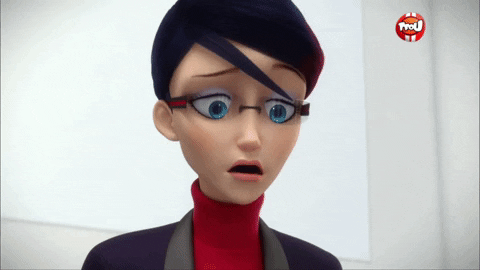
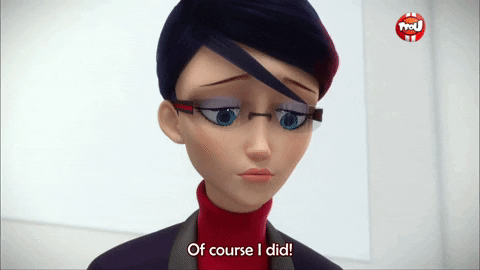
This is Adriens first birthday after Emilies dissappearence and it's incredibly telling how Gabriel handles the planning.
What this entire little sequence tells me is that Gabriel is completely and UTTERLY used to NOT be the one to take care of anything related to Adriens birthday. So Emilie was always the one who did it but somehow - now without her - Gabriel apparently still hasn't even considered changing anything about that nasty non-involvement and just expected Natalie to pick everything up where Emilie left it.
Because let's be real here, knowing Natalie she would NOT have forgotten to get a present if Gabriel truly had told her to. Natalie is never presented to do mistakes like that but Gabriel on the other hand IS definitely presented to us claiming things about himself as ultimate, blameless and true when they simply do not reflect reality. A great example: Gorizilla
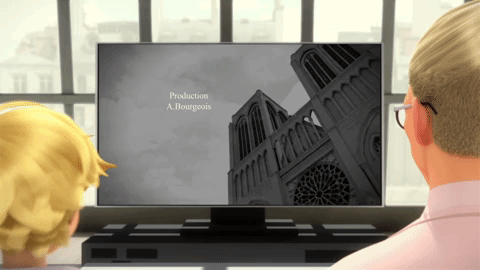
You didn’t even speared a minutes of your time for Adrien and he DID try to! Asshat… It's a problem guys. The lack of self awareness Gabriel displays in moments like this is legitimately concerning when you think about how deeply this man is falling right now.
But back to the topic:
Because even if Gabriel didn't even consider doing anything himself for Adriens birthday - not even taking the time to SEE his son (who just recently lost his mother, come on Gabe, really?) - one thing one cannot hold against him: he sure as hell remembered Adriens birthday like any decent parent would and it wasnt portrayed as a this-year-for-the-first-time thing.
And yet Adriens statement still makes complete sense. Because a big, BIG problem with Gabriel is just how much he takes things for granted. He EXPECTS things to be universally known and to never be doubted, just because that's how HE sees them. I will write 10 essays if it's needed to make people understand that Gabriel DOES truly love Adrien, it's just that Gabriel HIMSELF is such a rotten, twisted and toxic person that he cannot see how much his (oppressing) behavior and the way he (doesn't) express his love hurts Adrien and that HE is the one at fault. (for more, once again, read this)
Gabriel LOVES Adrien but he takes the love he feels as such a matter-of-fact that he just completely... forgets to show it.
And when we take Adriens words and look at the Family portrait it unfortunately seems that...

…. Gabriel ALWAYS forgot to show it.
Adriens hand - that should at least be reaching out to his father - is outside of the heart in accepting certainty. Because that's what Gabriels non-presence was for Adrien while growing up: an unreliable and unreachable certainty he had to accept early on as safer to not try to emotionally depend on too much or else he will get hurt.
So yeah, Adrien is the one in the portrait who is very openly not reaching out but only because Gabriel never gave him the needed affection and stability to be able to create that bond.
But let me correct what I said a little earlier: Adrien ALWAYS needed his father. Every kid, especially one in a bad situation like Adrien, does need their parents/friends etc as support system to become independent and confident in a healthy way. And if they don’t have that they WILL crave and look for it!
What Adrien has been doing up to now IS normal for a teenager - humans NEED affection, belonging and safety. What ISNT/SHOULDN’T be normal is Adriens disconnection towards his father in the portrait and just how much Gabriel fails to take care and BE THERE for his son in BOTH TIMES!
Collector:
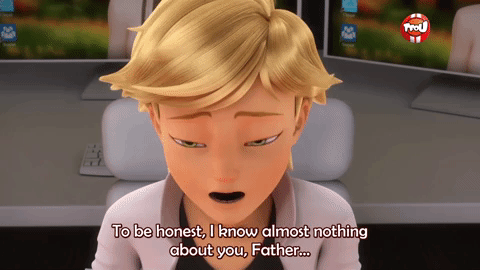
Bother Christmas:
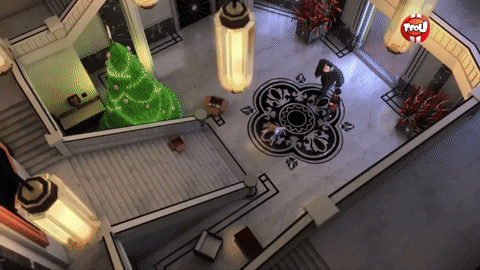
One thing I like about the show is that it portrays their young main cast with one very important truth: The psyche of a child/teenager of their age will react and adapt so it SURVIVES, even if it results in unfortunate consequences in other relationships and places. Thats the psyches main concern and it'll try to cope with the limited experience and development it has in whatever way necessary to get itself to the next day. A coping mechanism is not there to make you a better person, it ensures your SURVIVAL, everything else is a secondary concern.
So seeing pre-show Adrien not react to Gabriels touch and even feel completely unloved and disconnected from him is no surprise to me. Kids are incredibly observant. They may lack the needed experience and knowledge to truly understand that they deserve better and to stand up for themselves but they are masters in picking up red flags in people and can put this danger into perspective while comparing the different danger levels of their options of people and places to adjust their behavior.
Feast:
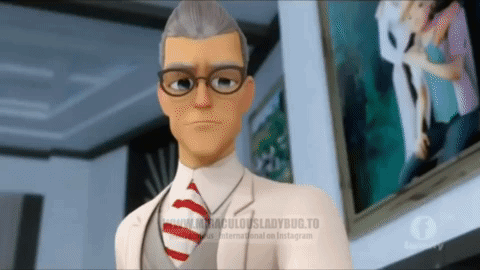
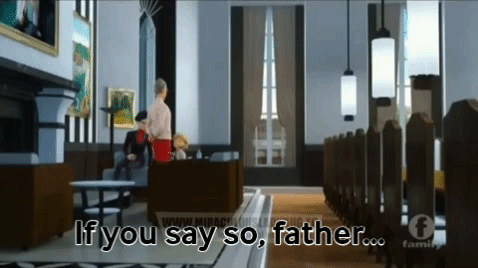
Stormy Weather 2:



So the broken connection between father and son we see in the portrait (that Gabriel doesn't even notice but Adrien fully internalized) isn’t there because Adrien “didnt needed” or wanted his father, its because Adrien NEEDED Gabriel so much in his isolated upbringing but Gabriel didn’t LET him need him - so Adrien had to adjust to that accordingly. Big, huge, ENORMOUS difference.
Honestly the most miraculous thing about Miraculous is that Adrien was able to bring up the strength to stay positive and friendly and to forgive Gabriel in hope for a better future. That boys situation is 7 kinds of depressing and traumatizing...
It's just flabbergasting to me how well this portrait shows how basically non-existent their relationship was at that point. And it's horrible to know that this estranged and unformed bond is all Adrien had left after Emilie dissappeared, just alot worse because after Emilie incident Adrien states that his father changed alot for the worse as well.
So to think that all Adrien had left wasn't even this former basically non-existent relationship with his aloof father - who would only barely show his true affection for his son because he's either not around enough to do so or he thinks it "unnecessary to proof his affection" for/to Adrien because he already thinks it so obvious and undoubtable.
Well he thought wrong. And GOSH, it breaks my heart!
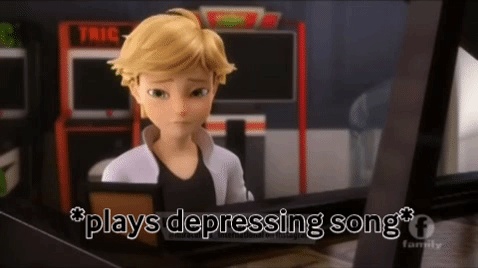
So now comparing the "Gabriel" hand from Adrien with the one representing his connections with his mother conveys a pretty harsh contrast.
Because last but not least, let's take a look at Emilies hand placements:
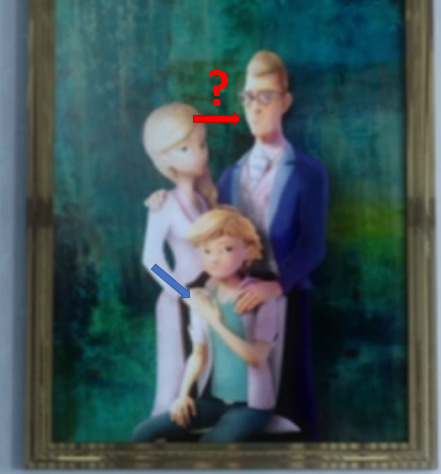
But here is now an interesting difference to Adrien. Whereas we openly see that Adriens side of the Adrien-Gabriel relationship is completely disconnected from the heart/love - showcasing just how badly Adrien has always been neglected by his father - we don't see Emilies hand in her Emilie-Gabriel relationship AT ALL.
Once again just like with Adrien, this doesn't mean she didn't love her husband and that Gabriel was used and fooled by the woman he so utterly adored. It just means that from Emilies point of view things were a bit more complicated. What exactly this is, the portrait is keeping secret from us. We have no way of knowing if and how Emilie is returning her husbands gesture. All we can say is that if she does she is definitely not doing it in such an open and unconflicted way as she does with Adrien.
But since when has anything with this family been this easy?
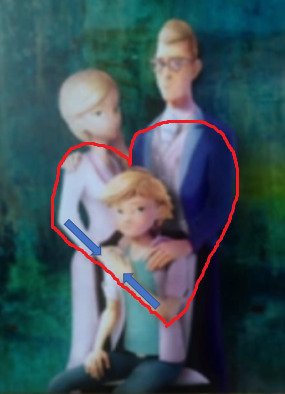
One thing the portrait makes very clear, Adrien and Emilie had a strong and good bond. Definitely the healthiest because the Adrien-Emilie connection is the only one depicted without any kind of disruption from both sides. Both mother and son are reaching out for the other ones hand creating a whole half of the heart, showcasing their affection for another openly and without any of the implied doubts the other connections display. And honestly? Comparing all the hand placements, the one connecting Adrien and Emilie just comes across as strikingly pure and true (which makes it even worse that it was HER Adrien lost…)
As I said it's a HARSH contrast to the one Adrien shears with Gabriel. This contrast is highlighted even further by the way these three face on another.
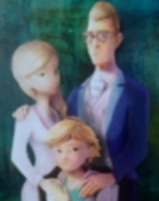
Emilie and Adrien are positioned facing another and so are Emilie and Gabriel. Telling us that Emilie was "face-to-face" aka involved with both her husband and son. It is Adrien and Gabriel were this looks wildly different. These two have no way of seeing each other in the eyes the way they stand now/then, further displaying their deeply rooted disconnection. It's portrays perfectly how important Emilie was in this family dynamic, because even though Adrien and Gabriel bearly had a connection at all they at least had Emilie as a link between them, keeping the family together. But then they lost her and where this left both father and son off we know oh too well...

So to collect all the informations we get out if this portrait:
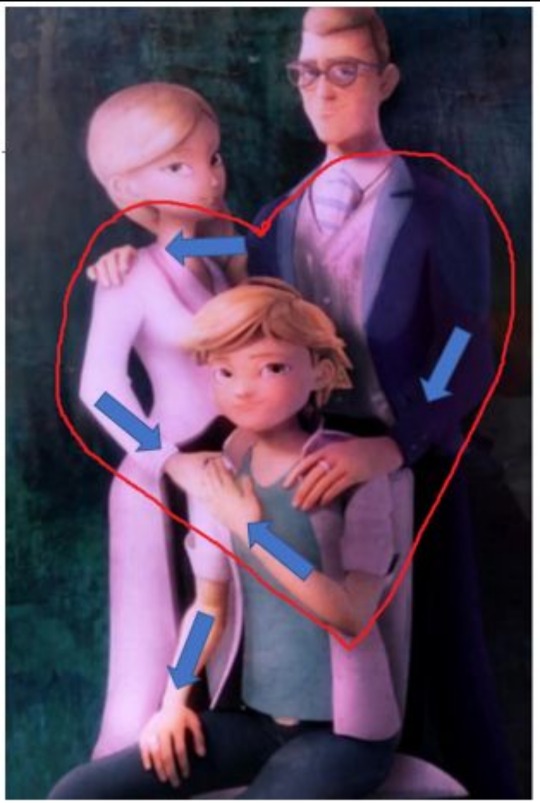
-Adriens and Emilies relationship was the strongest and purest. Both of their hands connect and reach out for another in the heart, showcasing that they had a loving and positive bond.
-Adriens and Gabriels relationship is heavily scarred by a deeply rooted disconnection leaving Adrien feeling unloved and unwanted by his father to the point where Adriens side of their dynamic is outside the heart altogether. Gabriel may love and adore his son just like he loves his wife and never thought he displayed his love for him in a lacking way, but fact is: this love never reached Adrien the way it should have and Adrien is the one in their dynamic who got severely hurt and damaged by it.
-Gabriel was the only one completely unconflicted and happily at peace with the former Family situation. He's reaching out to both his family members with open love and affection in blissful oblivion that neither his wife nor son could return them the same way (to different degrees for different reasons). Gabriel was the ONLY ONE in the Agreste family who didn't saw problems in their lives and thought them all happy, hence why he's so obsessed with changing the past and bringing THIS state of their family back. He was happy and he had everything he needed and loved right with him, of course he wants THIS back. He's not aware that Emilie and ESPECIALLY Adrien did not feel the same about their former situation and that bringing all of them back to this is not the perfect happy ending for their entire family as he thinks.
-Emilie may not have been as unconflicted with Gabriel as he was with her but she is NOT feeling the same disconnection her son feels and isn't depicted with negative feelings towards Gabriel. Her side in the Emilie-Gabriel relationship is neither shown outright positive as with her son or outright bad as Adrien with Gabriel. Her side of their bond is depicted through her unseen hand placement in the unknown area in between.
-Despite their not so unconflicted feelings towards Gabriel - and Gabriel himself being aloof - neither Emilie nor Adrien are actively trying to cut Gabriel out. They aren't flinching away from his touch or exclude him from the heart whatsoever. He's happily included, obviously feeling loved. They may not be 100% happy and Gabriel doesn't notice it, but they aren't denying him his happiness and make him unhappy. Again, he's the only one truly happy here. Something neither Emilie nor Adrien tried to take away from him.
-Emilie and Adrien are facing each other as do Emilie and Gabriel, implying the presence of communication and a bond. Adrien and Gabriel do not face each other, showing their disconnected bond. If they could see each others face Adrien would have been able to see that Gabriels hand is a gesture of genuine affection and Gabriel could see that Adriens expression does not exactly display pure happiness the way he thinks. This also goes for Emilie. Emilie just like her husband is placed BEHIND her son, so even if she is facing him she would not be able to really see just how much Adrien is not satisfied and truly happy with his life at that point (meaning how unhappy being looked up, friendless and at distance with his father actually makes him).
- This fascinating family makes me sad and I like it lol
#Miraculous#Miraculous Ladybug#adrien agreste#Gabriel Agreste#Emilie Agreste#family agreste#Agreste tragedy#natalie sancoeur#Agreste family portrait#Chat Noir#Cat Noir#hawkmoth#le papillon#ml analysis#this family is fascinatingly depressing to think about#I love them#I want Adrien safe and sound and loved with the Dupain-Changs#because everything Agreste is doomed and I want my son to be happy#Gabriel Agreste needs priorities#and Emilie needs to tell me what the fuck she did to set all of this off
735 notes
·
View notes
Text
Hot takes about Severus Snape are a wierdly decent glimpse into how a person with progressive values analyses things. Literally every time someone talks about Snape, it’s like this tiny window into how one-dimentionally people actually think.
Recently saw a twitter post that was a fantastic example. Here’s how it goes (paraphrasing):
Person A:“Snape is POC and Queer coded, that’s why you guy’s hate him uwu lol.”
Person B: “Actually I hate him because he was mean and abusive to children under his care uwu but go off I guess lol”
Both of these takes are designed to be dramatic and/or reactionary. They each use partial truths to paint very broad strokes. These are get-em-in-one-hit quips. This is virtue signalling, if you’ll excuse that loaded phrase. Nobody had a substantial conversation, but now everyone who sees their statement knows the high ground they took.
At least a hundred other people chimed in to add their own little quippy hot takes into play, none of which add anything significant, but clearly made everyone feel very highly of themselves.
So many layers of nuance and complex analysis is completely lost in this kind of discussion. On tumblr, you get more of this kind of bullshit, but you don’t have a word count limit, so you guys just spew endless mountains of weak overblown evidence backing up your bullshit arguments, none of which was really about engaging in a real conversation anyway.
Here’s the thing about Snape.
He is a childhood domestic abuse victim. His abuser is a muggle.
He becomes a student at a magical school that takes him away from his abuser and immediately instills in him the idea that being a part of this magical world is a badge of self-worth, empowerment, and provides safety and security - provided that he keeps in line.
There is a war is being waged in that world over his right to exist (he is a half blood).
He is a marginalized person within the context of the narrative, forced to constantly be in the same living space as the children of his own oppressors who are being groomed and recruited into a hate group militia (the pureblood slytherins). They are in turn trying to do the same to him.
He is marginalized person bullied by children who are also part of his oppressor group, but who have “more liberal” leanings and aren’t direct about why he’s being targeted (the mauraders are all purebloods, Sirius, who was the worst offender, was raised in a bigoted household, the same one that produced Bellatrix.).
He had a crush on a girl who is a muggleborn, and therefore she is considered even lesser than him and carries a stigma to those who associate with her. That girl was his only real friend. In his entire life.
For both Snape and Lily, allying themselves to a pureblood clique within their own houses would be a great way of shielding themselves from a measure of the bigotry they were probably facing. There would have been obvious pressure from those cliques to disconnect with one and other.
Every other person who associates with Snape in his adulthood carries some sort of sociopolitical or workplace (or hate cult) baggage with their association. Some of them will physically harm and/or kill him if he steps out of line. He hasn’t at any point had the right environment to heal and adjust from these childhood experiences. Even his relationship with Dumbledore is charged with constant baggage, including the purebloods who almost killed him during their bullying getting a slap on the wrist, the werewolf that almost killed him as a child being placed in an authority position over new children, etc. Dumbledore is canonically manipulative no matter his good qualities, and he has literally been manipulating Snape for years in order to cultivate a necessary asset in the war.
He is a person who is not in the stable mental state necessary to be teaching children, whom has been forced to teach children. While also playing the role of double agent against the hate group militia, the one that will literally torture you for mistakes or backtalk or just for fun. The one that will torture and kill him if he makes one wrong move.
Is the math clicking yet? From all of this, it’s not difficult to see how everything shitty about Snape was cultivated for him by his environment. Snape was not given great options. Snape made amazingly awful choices, and also some amazingly difficult, courageous ones. Snape was ultimately a human who had an extremely bad life, in which his options were incredibly grim and limited.
In fact, pretty much every point people make about how shitty Snape is as a person makes 100% logical sense as something that would emerge from how he was treated. Some if it he’s kind of right about, some of it is the inevitable reality of suffering, and some of it is part of the cycle of abuse and harm.
Even Snape’s emotional obsession with Lily makes logical sense when you have the perspective that he literally has no substantial positive experiences with other human beings that we know of, and he has an extreme, soul destroying guilt complex over her death. Calling him an Incel mysoginist nice guy projects a real-world political ideology and behavior that does not really apply to the context of what happened to him and her.
Even Snape’s specific little acts of cruelty to certain students is a reflection of his own life experiences. He identifies with Neville; more specifically, he identifies his own percieved emotional weaknesses in his childhood in Neville. There’s a very sad reason there why he feels the urge to be so harsh.
Snape very clearly hates himself, in a world where everyone else hates him, too. Imagine that, for a second. Imagine total internal and external hatred, an yearning for just a little bit of true connection. For years. Imagine then also trying to save that world, even if it’s motivated by guilt. Even if nobody ever knows you did it and you expect to die a miserable death alone.
There are more elements here to consider, including the way Rowling described his looks (there may be something in there re: ugliness and swarthy stereotyping). These are just the things that stand out the most prominently to me.
J.K. Rowling is clearly also not reliable as an imparter of moral or sociopolitical philosophies. I don’t feel that her grasp of minority experiences is a solid one, considering how she picks and chooses who is acceptable and who is a threat.
All of that said, this is a logically consistent character arc. Within the context of his narrative, Snape is a marginalized person with severe PTSD and emotional instability issues who has absolutely no room available to him for self-improvement or healing, and never really has. And yes, he’s also mean, and caustic, and verbally abusive to the students. He’s also a completey miserable, lonely person.
There are elements in his character arc that mirror real world experiences quite well. If nothing else, Rowling is enough of an emotional adult to recognise these kinds of things and portray something that feels authentic.
In my opinion, it’s not appropriate to whittle all this down by comparing him directly to the real world experiences of marginalized groups - at least if you are not a part of the group you are comparing him to. There have been many individuals who have compared his arc to their own personal experiences of marginalization, and that is valid. But generally speaking, comparing a white straight dude to people who are not that can often be pretty offensive. This is not a valuable way to discuss either subject.
Also, I believe that while it’s perfectly okay to not like Snape as a character, many of the people who act like Person B are carrying Harry’s childhood POV about Snape in their hearts well into their own adulthood. And if nothing else, Rowling was attempting to say something here about how our perspectives (should) grow and change as we emotionally mature. She doesn’t have to be a good person herself to have expressed something true about the world in this instance, and since this story is a part of our popular culture, people have a right to feel whatever way they do about this story and it’s characters.
The complexity of this particular snapshot of fictionalized marginalization, and what it reveals about the human experience, cannot be reduced down to “he’s an abuser so he’s not worth anyone’s time/you are bad for liking him.”
And to be honest, I think that it reveals a lot about many of us in progressive spaces, particularly those of us who less marginalized but very loud about our values, that we refuse to engage with these complexities in leu of totally condemning him. Particularly because a lot of the elements I listed above are indeed reflected in real world examples of people who have experienced marginalization and thus had to deal with the resulting emotional damage, an mental illness, and behavior troubles, and bad decisions. Our inability to address the full scope of this may be a good reflection of how we are handling the complexity of real world examples.
Real people are not perfect angels in their victimhood. They are just humans who are victims, and we all have the capacity to be cruel and abusive in a world where we have been given cruelty and abuse. This is just a part of existing. If you cannot sympathise with that, or at least grasp it and aknowledge it and respect the people who are emotionally drawn to a character who refects that, then you may be telling on yourself to be honest.
To be honest, this is especially true if you hate Snape but just really, really love the Mauraduers. You have a right to those feelings, but if you are moralizing this and judging others for liking Snape, you’ve confessed to something about how you’ve mentally constructed your personal values in a way I don’t think you’ve fully grasped yet.
I have a hard time imagining a mindset where a story like Snape’s does not move one to empathy and vicarious grief, if I’m honest. I feel like some people really just cannot be bothered to imagine themselves in other people’s shoes, feeling what they feel and living like they live. I struggle to trust the social politics of people who show these kinds of colors, tbh.
But maybe that’s just me.
270 notes
·
View notes
Note
Thoughts on the new discourse? Warrior cats naming conventions and rank names being straight up stolen from native American people? So many people seem to be... Straight up leaving the Fandom or changing all of their fan content and it feels very performative and, people not actually thinking critically and just being scared of getting "cancelled"? I feel like your opinions on these matters are very informed and well written so I wanted to ask given that this blog main theme is, well, warrior cat naming system and that seems to be the main issue of the new discourse.
This is probably going to get long, since there's sort of a lot to say about it in order to talk about this whole thing fairly and constructively, because from what I’ve seen there’s a lot of hyperbole happening, and panicking, and disavowing this series and fandom, and so on, like you say, and also some people genuinely trying to have complex meaningful conversations about racism in xenofiction, and also probably some bad faith actors in the mix--as well as some just... stupid actors. Kind of inevitably what happens when two equally bad platforms for having nuanced discussions--i.e., twitter and tumblr--run headlong into each other, in a fandom space with a majority demographic of basically kids and highly anxious, pretty online teens. I don’t mean that as a criticism of fans or their desire to be liked by peers and “correct” about opinions, it’s just the social landscape of Warriors and I think it’s worth pointing out from the start.
If I’m totally honest with you, if not for this ask, I wouldn’t actually be commenting on it at all, because none of this is going to impact this blog or change how I run it in any way. But since you’ve asked and frankly I do feel some responsibility to try to disentangle things a little for everyone stressed and confused at the moment, because I know a lot of people look to this blog for guidance of all sorts, I’m going to talk about what I think has happened here, and how to navigate the situation in a reasonable way.
Quick recap for anyone blissfully unaware: from what I understand, this post (migrated over from a presumably bigger twitter thread) has got a lot of people very worried about Warriors being a racist and appropriative series, and now are trying to figure out what ethically to do about this revelation. The thing I found most interesting about this screenshotted conversation is that it makes a lot of bold claims, but misses some pretty surprising details (in my opinion). If you do look critically at what is being said, here’s a few things to notice--crucially, there are two people talking.
Person 1 says that a lot of animal fantasy fiction + xenofiction (fiction about non-human/”other” beings, such as animals) is frequently built upon stereotypes of First Nations and Indigenous people, and/or appropriates elements of Indigenous culture and tradition as basically set dressing for “strange” and “alien” races/species etc., and this is a racist, deeply othering, and inappropriate practice. This person is right.
I’ve spent years researching in this field specifically, so I feel pretty confident in vouching (for whatever that’s worth) that this person is absolutely right in making this point. Not only is it frequently in animal fiction/xenofiction, but it’s insidious, which means often it’s hard to notice when it’s happening--unless you know what you’re looking for, or you are personally familiar with the details or tropes that are being appropriated. Because of the nature of racism, white and other non-First Nations people don’t always recognise this trend within texts--even texts they’re creating--but it’s important for us all, and especially white people, to be more aware, because it’s not actually First Nations’ people’s responsibility to be the sole critics of this tradition of theft and misuse. Appropriation by non-Indigenous people is in fact the problem, which means non-Indigenous people learning and changing is the solution.
Person 1 offers Warriors as a popular example of a work that has this problem. Notably, this person hasn’t given an example of how Warriors is culpable (at least in this screenshot and I haven’t found the thread itself, because the screenshot is what’s causing this conversation), only that it’s an example of a work that has these problems. And once again, this person is correct. We’ll look at that more in a moment.
Person 2 (three tweets below the first) offers, by comparison, several more specious insights. Firstly, it’s really, really not the only time anyone’s ever talked about this, academically + creatively or in the Warriors fandom specifically, and so that reveals somewhat this person’s previous engagement in the space they’re talking into re: this topic. In other words, this person doesn’t know what has already been said or what is being talked about. Secondly, this person explicitly states that they “[don’t know] much about warrior cats specifically but from what I see it just screams appropriation,” which as a statement I think says something crucial re: the critical lens this person has applied + the amount of forethought and depth of analysis of their criticism of this particular series.
I’m not saying that using twitter to talk about your personal feelings requires you to research everything you talk about before you shoot your mouth off. However, I personally don’t go into a conversation about a topic I don’t know anything about except a cursory glance to offer bold and scathing criticisms based on what it “just screams” to me. By their own admission, this person isn’t really offering good faith, thoughtful criticism of the series, in line with Person 1′s tweet. Instead, Person 2 is talking pretty condescendingly and emphatically about--as the kids say--the vibes they get from the series, and I’m afraid that just doesn’t hold up well in this court.
So now that there’s Person 1 (i.e., very reasonable, important, interesting criticism) and Person 2 (i.e., impassioned but completely vibes-based opinion from someone who hasn’t read the books) separated, we can see there’s actually several things happening in this brief snapshot, and some of them aren’t super congruent with each other.
Person 1 didn’t say “don’t read bad books,” or that you’re a bad person for being a fan of stories that are guilty of this. They suggested people should recognise the ways xenofiction uses Indigenous people and their culture inappropriately and often for profit. My understanding of this tweet is someone offering an insight that might not have occurred to many people, but that is valuable and important to consider going forward in how they view, engage with, and create xenofiction media.
Person 2 uses high modality, evocative language that appeals to the emotions. That’s not a criticism of this person: they’re allowed to talk in whatever tone they want, and to express their personal feelings and opinions. However, rhetorically, this person is using this specific language--consciously or subconsciously--to incense their audience--i.e., you. Are you feeling called to action? What action do you feel called to when you rea their words, despite the fact their claims are not based in their own actual analysis of or engagement with the text? It’s, by their own admission, not analysis at all. Everything they evoke is purely in the name of “not good” vibes.
Earlier I mentioned that Person 1 is correct that Warriors is absolutely guilty of appropriation of First Nations and Indigenous people and culture. I also mentioned that they didn’t specify how. That’s because I think the most egregious example is in fact the tribe, which in many ways plays into the exact kind of stereotyping and appropriation of First Nations Americans that Person 1 mentions, and not the clans, contrary to Person 2′s suggestion. For instance, in addition to the very loaded name of “tribe”, there’s a lot of racist tropes present in how that group of cats is introduced and how the clan cats interact with them, as well as the more North American-inspired scenery of their home. It’s very blatant as far as racism in this series.
When it comes to the clans themselves, though, I think it’s muddier and harder to draw clear distinctions of what is directly appropriative, what is coincidentally and superficially reminiscent, and what is not related at all. Part of this difficulty in drawing hard lines comes from the fact that, on a personal level, it actually doesn’t matter: if a First Nations person reads a story and feel it is appropriative or inappropriate, it’s not actually anyone’s place to “correct” them on their reading of the text. Our experiences are unique and informed by our perspectives and values, and no group of people are a monolith, which means within community, there will always be disagreement and differenting points of view. There is no one single truth or opinion, which means that First Nations people even in the same family might have very different feelings about the same text and very different perspectives on how respectful, or not, it might be.
I’m saying this because something that gets said very often when conversations of racism and similar oppressive systems present/perpetuated in texts comes up, people frequently say: “listen to x voices.” It is excellent advice. However, the less pithy but equally valuable follow-up advice is: “listen to the voices of many people of x group, gather information and perspective, and then ultimately use your own judgement to make an informed opinion for yourself.” It means that you are responsible for you. The insight you can gain by listening to people who know topics and experiences far better than you do is truly invaluable, but if your approach to the world is simply to parrot the first voice, or loudest voice, or angriest voice you come across, you will not really learn anything or be able to develop your own understanding and you certainly won’t be making well-informed judgements.
In other words, one incomplete tweet thread from two people who are each bringing quite different topics and modes of conversation (or perhaps gripes, in Person 2′s case) to the table is not really enough to go off re: making a decision to leave a fandom, in my opinion. In fact, I think in responding to anything difficult, complex, or problematic (which doesn’t mean what popular adage bandies it about to mean) by trying to distance yourself, or cleanse of it, will ultimately harm you and will not do you any good as a person. It is better, in my opinion, to enter into complex relationships with the world and media and other people in an informed, aware way and with a willingness to learn and sometimes to make mistakes and be wrong, rather than shy away from potential conflict or fear that interacting with a text will somehow taint you or define your morality in absolutes.
So. Does Warriors have racist and appropriative elements, tropes, and issues in the series? Yes, of course it does, it’s a book-packaged series produced by corporation HarperCollins and written by a handful of white British women and their myriad ghostwriters. Racism is just one part of the picture. The books are frequently also ableist, sexist, and homophobic (or heteronormative, depending how you want to slice it, I guess), just to name some of the most evident problems.
But does the presence of these issues mean it’s contaminated and shouldn’t be touched? Personally, I don’t think so. Given the nature of existing the world, it’s not possible to find perfect media that is free of any kind of bias, prejudice, or even just ideas or topics or concepts that are challenging or uncomfortable. I think it’s more meaningful to choose to engage with these elements, discuss them, criticise them, learn from them, and acknowledge also that imperfection is the ultimate destiny of all of us, especially creators.
I’m not saying that as a pass, like, “oh enjoy your media willy-nilly, nothing matters, do what you want, think about no-one else ever because we’re all flawed beings,” but rather that it’s important not to look away from the problems in the things we enjoy, rather than cut off all contact and enjoyment when we realise the problems. That doesn’t mean you have to only criticise and always be talking about how bad a thing you like is either, publicly admonishing yourself or the text, because that’s also not a constructive way to engage with media.
As I said, there’s a lot to say here, and believe it or not, this is honestly the shortest version I could manage. There’s always more to say and plenty I haven’t talked about, but pretty much tl;dr:
I don’t find Person 2′s commentary particularly compelling, personally, because I think it’s a little broad and a little specious in its conclusions and evidence, and I also suspect that this person is speaking more from their feelings than from a genuine desire to educate or meaningfully criticise, unlike Person 1. That’s not to say Warriors isn’t frequently racist and guilty of the issues Person 1 is discussing, because it is, but I don’t think this tweet thread is a great source of insight into the ongoing history of this problem in xenofiction, or Warriors specifically, on its own. I would recommend exploring further afield to learn more from a variety of sources and form your own opinions. I hope this helps.
#just in case anyone sees this post and gets the wrong idea: i'm not inviting debate on this.#i am saying that first nations people are allowed to have ANY relationship with texts because that's how subjectivity works.#they are allowed to have negative neutral or positive experiences of texts--even 'bad' ones that have a lot of problems.#the people in this tweet are just talking about their thoughts and it's their bad luck the world's a public forum and it's spiralled.#the other thing i am saying is that if your approach to media is exclusively to cut out any problematic text like it's a cancer#that's not a great strategy. just straight up. you're better off developing critical insight and your own opinions and confidence.#by most parameters i can think of warriors as a series pretty much sucks really bad and i've been saying that for nearly ten years.#despite being so phenomenally flawed it can still have value--and much of its value in my opinion is IN these conversations about it.#so yeah tl;dr 2: i'm not here to slap-fight with teens which is what much discourse devolves to after 5 mins on tumblr so don't try it.
90 notes
·
View notes
Text
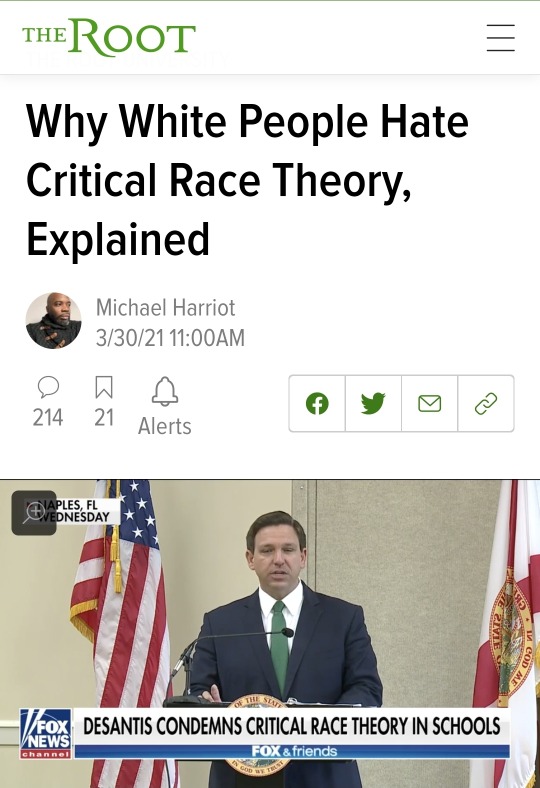
What is Critical Race Theory?
Basically, Critical Race Theory is a way of using race as a lens through which one can critically examine social structures. While initially used to study law, like most critical theory, it emerged as a lens through which one could understand and change politics, economics and society as a whole. Richard Delgado and Jean Stefancic’s book, Critical Race Theory: An Introduction, describes the movement as: “a collection of activists and scholars engaged in studying and transforming the relationship among race, racism, and power.”
Kimberlé Crenshaw, one of the founding members of the movement, says Critical Race Theory is more than just a collective group. She calls it: “a practice—a way of seeing how the fiction of race has been transformed into concrete racial inequities.”
It’s much more complex than that, which is why there’s an entire book about it.
Can you put it in layman’s terms?
Sure.
Former economics professor (he prefers the term “wypipologist”) Michael Harriot, who used Critical Race Theory to teach “Race as an Economic Construct,” explained it this way:
Race is just some shit white people made up.
Nearly all biologists, geneticists and social scientists agree that there is no biological, genetic or scientific foundation for race. But, just because we recognize the lack of a scientific basis for race doesn’t mean that it is not real. Most societies are organized around agreed-upon principles and values that smart people call “social constructs.” It’s why Queen Elizabeth gets to live in a castle and why gold is more valuable than iron pyrite. Constitutions, laws, political parties, and even the value of currency are all real and they’re shit people made up.
To effectively understand anything we have to understand its history and what necessitated its existence. Becoming a lawyer requires learning about legal theory and “Constitutional Law.” A complete understanding of economics include the laws of supply and demand, why certain metals are considered “precious,” or why paper money has value. But we can’t do that without critically interrogating who made these constructs and who benefitted from them.
One can’t understand the political, economic and social structure of America without understanding the Constitution. And it is impossible to understand the Constitution without acknowledging that it was devised by 39 white men, 25 of whom were slave owners. Therefore, any reasonable understanding of America begins with the critical examination of the impact of race and slavery on the political, economic and social structure of this country.
That’s what Critical Race Theory does.
How does CRT do that?
It begins with the acknowledgment that the American society’s foundational structure serves the needs of the dominant society. Because this structure benefits the members of the dominant society, they are resistant to eradicating or changing it, and this resistance makes this structural inequality.
Critical Race Theory also insists that a neutral, “color-blind” policy is not the way to eliminate America’s racial caste system. And, unlike many other social theories, CRT is an activist movement, which means it doesn’t just seek to understand racial hierarchies, it also seeks to eliminate them.
How would CRT eliminate that? By blaming white people?
This is the crazy part. It’s not about blaming anyone.
Instead of the idiotic concept of colorblindness, CRT says that a comprehensive understanding of any aspect of American society requires an appreciation of the complex and intricate consequences of systemic inequality. And, according to CRT, this approach should inform policy decisions, legislation and every other element in society.
Take something as simple as college admission, for instance. People who “don’t see color” insist that we should only use neutral, merit-based metrics such as SAT scores and grades. However, Critical Race Theory acknowledges that SAT scores are influenced by socioeconomic status, access to resources and school quality. It suggests that colleges can’t accurately judge a student’s ability to succeed unless they consider the effects of the racial wealth gap, redlining, and race-based school inequality. Without this kind of holistic approach, admissions assessments will always favor white people.
CRT doesn’t just say this is racist, it explains why these kinds of race-neutral assessments are bad at assessing things.
What’s wrong with that?
Remember all that stuff I said the “material needs of the dominant society?” Well, “dominant society” means “white people.” And when I talked about “racial hierarchies,” that meant “racism.” So, according to Critical Race Theory, not only is racism an ordinary social construct that benefits white people, but it is so ordinary that white people can easily pretend it doesn’t exist. Furthermore, white people who refuse to acknowledge and dismantle this unremarkable, racist status quo are complicit in racism because, again, they are the beneficiaries of racism.
But, because white people believe racism means screaming the n-word or burning crosses on lawns, the idea that someone can be racist by doing absolutely nothing is very triggering. Let’s use our previous example of the college admissions system.
White people’s kids are more likely to get into college using a racist admissions system. But the system has been around so long that it has become ordinary. So ordinary, in fact, that we actually think SAT scores mean shit. And white people uphold the racist college admissions system—not because they don’t want Black kids to go to college—because they don’t want to change admission policies that benefit white kids.
Is that why they hate Critical Race Theory?
Nah. They don’t know what it is.
Whenever words “white people” or “racism” are even whispered, Caucasian Americans lose their ability to hear anything else. If America is indeed the greatest country in the world, then any criticism of their beloved nation is considered a personal attack—especially if the criticism comes from someone who is not white.
They are fine with moving toward a “more perfect union” or the charge to “make America great again.” But an entire field of Black scholarship based on the idea that their sweet land of liberty is inherently racist is too much for them to handle.
However, if someone is complicit in upholding a racist policy—for whatever reason—then they are complicit in racism. And if an entire country’s resistance to change—for whatever reason —creates more racism, then “racist” is the only way to accurately describe that society.
If they don’t know what it is, then how can they criticize it?
Have you met white people?
When has not knowing stuff ever stopped them from criticizing anything? They still think Colin Kaepernick was protesting the anthem, the military and the flag. They believe Black Lives Matter means white lives don’t. There aren’t any relevant criticisms other than they don’t like the word “racism” and “white people” anywhere near each other.
People like Ron DeSantis and Tom Cotton call it “cultural Marxism,” which is a historical dog whistle thrown at the civil rights movement, the Black Power movement and even the anti-lynching movement after World War I. They also criticize CRT’s basic use of personal narratives, insisting that a real academic analysis can’t be based on individually subjective stories.
Why wouldn’t that be a valid criticism?
Well, aren’t most social constructs centered in narrative structures? In law school, they refer to these individual stories as “legal precedent.” In psychology, examining a personal story is called “psychoanalysis.” In history, they call it...well, history. Narratives are the basis for every religious, political or social institution.
I wish there was a better example of an institution or document built around a singular narrative. It would change the entire constitution of this argument—but sadly, I can’t do it.
Jesus Christ, I wish I could think of one! That would be biblical!
Why do they say Critical Race Theory is not what Martin Luther King Jr. would have wanted?
You mean the Martin Luther King Jr. who conservatives also called divisive, race-baiting, anti-American and Marxist? The one whose work CRT is partially built upon? The King whose words the founders of Critical Race Theory warned would be “co-opted by rampant, in-your-face conservatism?” The MLK whose “content of their character” white people love to quote?
Martin Luther King Jr. literally encapsulated CRT by saying:
In their relations with Negroes, white people discovered that they had rejected the very center of their own ethical professions. They could not face the triumph of their lesser instincts and simultaneously have peace within. And so, to gain it, they rationalized—insisting that the unfortunate Negro, being less than human, deserved and even enjoyed second class status.
They argued that his inferior social, economic and political position was good for him. He was incapable of advancing beyond a fixed position and would therefore be happier if encouraged not to attempt the impossible. He is subjugated by a superior people with an advanced way of life. The “master race” will be able to civilize him to a limited degree, if only he will be true to his inferior nature and stay in his place.
White men soon came to forget that the Southern social culture and all its institutions had been organized to perpetuate this rationalization. They observed a caste system and quickly were conditioned to believe that its social results, which they had created, actually reflected the Negro’s innate and true nature.
That guy?
I have no idea.
Will white people ever accept Critical Race Theory?
Yes, one day I hope that Critical Race Theory will be totally disproven.
Wait...why?
Well, history cannot be erased. Truth can never become fiction. But there is a way for white people to disprove this notion.
Derrick Bell, who is considered to be the father of Critical Race Theory, notes that the people who benefit from racism have little incentive to eradicate it. Or, as Martin Luther King Jr. said: “We must also realize that privileged groups never give up their privileges voluntarily.”
So, if white people stopped being racist, then the whole thing falls apart!
From your lips to God’s ears.
164 notes
·
View notes
Note
if you had to rank your fav naruto characters how would it go? love your blog btw!!
Hmmm... Complicated ask, anon.😂
[My personal life would be splashed here and there. Please bear with me]
Before 5 months, if you asked me about Naruto, my response would be ‘What the fuck is that?’. I absolutely had no idea such a treasure existed. For me, it started out like a blockbuster movie for the sheer variety of fights and the resulting emotions it brought within me.
However, there was a point I stopped and thought, ‘Wait a fucking second. This resembles my family dynamics. This person is speaking the exact same lines I spoke to my parents few years ago. This person’s situation resembles mine. Did this creator a time traveler?’. Naruto is the only piece of media that gave me such feel. Am not even exaggerating, believe me.
I really liked so many characters very much but am going to try my best to list just 10.
The only characters I hate in this series are Danzo, Sakura and Hinata in no particular order. Meaning, I absolutely cannot see any positives in them. They are crassy, cringey and completely detestable.
FAVOURITE NARUTO CHARACTERS
10. Killer Bee
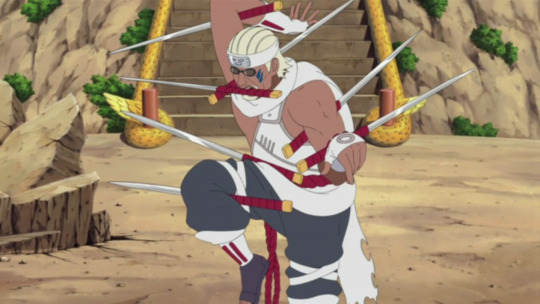
HaHaHa :-) Just seeing this character makes me smile and light-hearted.
It’s a pity that he is the only character who don’t belong to Konoha in my Top 10 rankings who was developed well apart from Gaara.
I loved him from Frame 1 onwards and I sincerely wished Team Taka should be packed up with their ass beaten up mercilessly. And that’s what happened.
Despite being a Jinchurikki, he never bothered to mind his surroundings and filled his heart with love from his over protective Brother alone was nice to watch.
He makes a great Tag Partner with Naruto next to Sasuke. No doubt.
The way Killer Bee treated Team Taka like some annoying flies and his cool and don’t care attitude was top notch. It’s not just with Sasuke, Bee treated Naruto with the same IDGAF attitude at first.
Best Moments:
Lariat punch to Sasuke (TBH, Sasuke deserved it. LOL)
Blasted off every member of Team Taka like a doll
His entire conversation and fight sequence with Kisame (Their banters and exchanges are way too hilarious)
His dynamics with his Elder Brother (God!!!! Whenever Raikage gives him an Iron Claw.... What a hilarious duo!!!!)
9. Hatake Kakashi
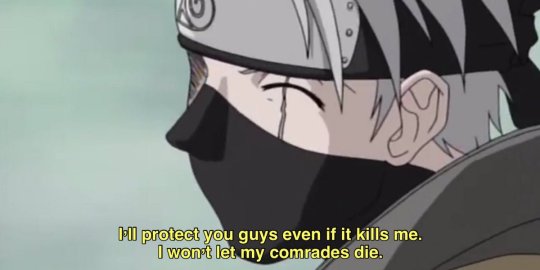
Kakashi was my most favourite character when I started the series for simply being ultra-cool with the way he conducted the Bell-Test and taught a valuable lesson for those bratty kids in Team 7 called ‘Team Work’.
Best Moments:
Kakashi vs Obito Hand-to-Hand Combat (the best in the series)
Kakashi in the Gaara retrieval arc (His fight with Itachi & Deidara gave a good start to the shippuden series. His Mangekyou reveal was surprising).
Kakashi & Guy teaming up with Naruto to reveal Obito in a twisty and tragic way. (Kakashi couldn’t handle the truth at all and neither did I)
Kakashi vs Zabuza (That’s when I realized that the series was getting real serious)
8. Jiraiya
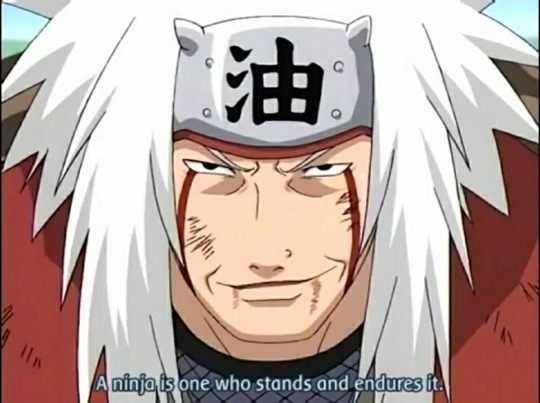
Jiraiya was my next favourite to Kakashi during my Part 1 days. His open perversion and his entire dynamics with Naruto was one of the best things during the Chunin Exams arc. Taught Naruto about Chakra Control and about the way of a shinobi by just enduring. Naruto follows this even today.
Best Moments:
Kuchiyose No Jutsu training (Man, I never expected him to push Naruto off the cliff)
Rasengan Training (One of the best arcs in part 1 and it was soo satisfying to see Naruto punching his first Rasengan on Kabuto, He also acted like a quasi parent to Naruto... heartwarming)
Jiraiya Vs Six paths of Pain ( 6 vs 1 was always doomed but still he had the guts of a shinobi and plunged ahead)
7. Uchiha Madara
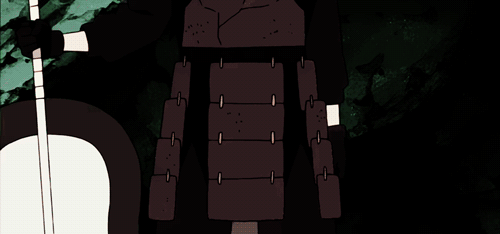
Geez. What is there to not like him??
Everything he did was absolutely wrong ever since he broke up with Hashirama in a romantic way much similar to how couples break up in my country.
I am an Uchiha. You are a Senju. I wish it had been different.
This roughly translates to how 75% of lovers break up and marry someone else from their own clan in my state. (Duh!!!)
I am from XXX clan, you are from XXX clan. So we can’t love each other and my parents won’t accept this relationship. So let’s break up.
Alright, my first shipping couple in this series is HashiMada for this exact reason. (I started shipping SNS only after episode 478).
Just like Hashirama, Madara had an extensive build up right from episode 1 where Kurama compares Sasuke with Madara. And flashbacks from Itachi and Tobi spiked my curiosity and I wanted to see his face so badly ever since.
But the moment he landed gracefully like a diva in episode 321.... Woaahhhh!!!! He literally danced in the battlefield and ate up 100′s of guys with just a fucking Sharingan.
Best Moments:
Going Shirtless before 1000′s of people with Hashirama’s face, no less (Well, I literally went heart-eyed for 5 minutes. Sorry Sasuke, your ancester was way much sexier than you in the Orochimaru hideout and beats you by a million points).
Screaming Hashirama’s name like a cockatoo for 300 times even till the very end (Sorry Naruto, your obsession towards Sasuke for about 6 arcs is pale in comparison to Madara’s obsession which was established in just 6 or 7 episodes.)
I have 25 clones now. Do you want me to put Susanoo or not? You can’t answer. The answer is yes. (Man, his I don’t give a fuck attitude is just an alien level thing)
Openly admitting Only Hashirama Can Beat Me (Say what you will about Sasuke, Madara has no qualms about accepting his inferiority in terms of power. An absolute Straight Forward diva-queen)
Awakening Sharingan for breaking up with his ‘friend’ rather than for his 3 dead brothers. (Geez, Poor Soul. He is the forefather of a Romantic Uchiha. That romantic blood still flows in Sasuke)
6. Senju Hashirama
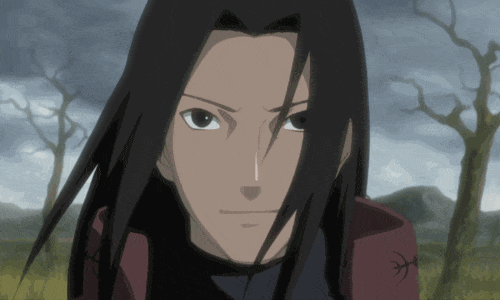
Man, I would have placed him somewhere in top 5 if only he was introduced early or had more scenes. I started watching Naruto only because of this very name. There is a local podcaster in my state who goes under the alias of Senju Hashirama and in his podcasts, he hinted about this character and how he was inspired by his ideals. I just googled and saw that this character belonged to Naruto series and I considered watching it. Here I am, making analysis on that very series.
There was this excellent build up for him right when we got introduced to Captain Yamato. He was constantly referred in flashbacks from Itachi and Tobi especially.
But the moment he was reanimated again..... Geez..... It was an hilarious ride all throughout. Out of all the flashbacks we got from this series, Founders Era flashback was my absolute favourite.
From where I come from, we are still under the stupid influence of Clan infrastructure and are not growing up in many aspects like people in western countries do. For me, I hope, one day, someone like Senju Hashirama appears in our state and change our lives for better by uniting all clans as one and treats everyone equally without the shitty favouritism for their own children, friends, parents, siblings.
That’s why this dialogue struck a thunder in my heart
“Be they a friend.... Be they a sibling.... Be it even my own child. I will not forgive anyone who threatens the village.”
Because the clan leaders in our place are absolutely selfish, trash bastards who serves their own needs with no regards for other people from other clans. For a person like me, Hashirama is not just a fictional hero, he is someone who many aspires to become. No wonder that podcaster chose this name as his alias.
He rightfully deserved the title ‘God of Shinobi’. And no one can surpass him, not even Naruto.
Best Moments:
Wood Style vs Eternal Mangekyou sharingan + Kurama powered Madara (He just beats Madara’s ass by a wide margin. This shows he was a whole fucking different level than Naruto + Sasuke combined. In terms of strength, nobody surpassed him YET. Sorry Naruto and Sasuke, you guys are no match even now with your Rinnegan and Kurama lost forever).
His entire banters with Madara (ROFLLLL. Without him, it would have been just another lifeless arc.)
5. Senju Tobirama
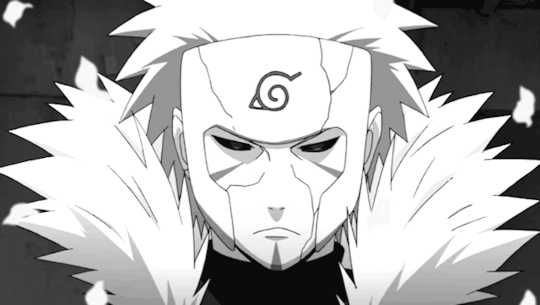
Hmmm, let me tell you something about him.
First off, he is not a racist or fascist as many hardcore Sasuke fanatics claims. He is one of the best hokages according to me. He is abso-fucking-lutely practical, rational, logical and holds no grudge. And Sasuke resembles Tobirama with all these characteristics as compared to soft and naive Naruto. If only he had more screen time, he would be easily in my top 3.
Just because he didn’t lick the boots of Uchiha (many people’s favorite clan or may I say the only clan that was given any shit about in this series), it doesn’t make him a racist or fascist.
No, he never persecuted the Uchihas. Danzo, the crass bastard, driven off the Uchihas only after the Kyuubi incident. It was explicitly mentioned in the databook and was clearly explained in the series.
He literally gave the highest position in the village for the entire clan. That is, a military power inside a military village. ‘Shinobi who can cause crimes can only be stopped by shinobi who are even better’. In my state, if a powerful clan decided to persecute another clan, they simply start by cutting off basic amenities like Water and Electricity. Compared to what I’ve seen, Tobirama did nothing but given the Uchihas, the highest position in their village.
Orochimaru only said giving such a power made them conceited (arrogant). Tobirama had a trusted subordinate called Kagami, an Uchiha in his team. He suggested Kabuto to help Sasuke and even teleported him on his request. He even spited Madara for killing Sasuke, an Uchiha. He openly claimed Uchiha clan exceeds Senju in terms of Love. He openly appreciated Itachi and Kagami as someone who sees beyond their clan. In what world, would a racist or fascist do all this for a clan he hates???
Yes, he was cautious of Sasuke at first because he saw him with Orochimaru and even went full-on battle mode because of Sasuke’s carefree threat to destroy the village. But once he decided to go to the battlefield to fight Madara, he simply forgot everything that happened before and started to work with him as a comrade, and even helped him twice. In which world, a racist or fascist behave this way?
Believe me, a person like me who was grown with these clan politics surely can say who is a fascist. He was not. He was just cautious of them because of their ability to attain superpowers with just emotions alone. Let me ask you all this, ‘Would you be okay with people getting crazy powers whenever they are depressed?’. Being cautious is not racism. It really disrespects people who faced real oppression under fascism.
What Madara and Danzo did was a classical example of fascism.
And No, Izuna didn’t die only because of Tobirama. He died because Madara was too arrogant to instigate war with Senju clan. And this was way before forming Konoha. If Tobirama killed Izuna after the alliance between Uchiha and Senju, I would agree that he was a racist. Izuna lost his life just like any other Uchiha and Senju soldiers in that battlefield.
Just because he shitted your beloved ‘Sasuke-Kun’ doesn’t mean he is a racist too. Tobirama saw Sasuke along with that scoundrel Orochimaru who once used this very two hokages to destroy the very village they strived hard to create and protect. What will you do, if you were in his place?? Please don’t lie and say ‘I wouldn’t be judgemental’.
And Imagine you are Tobirama, Sasuke is threatening to commit genocide against the entire village who had no idea about this coup detat instead of going against those old hags. Will you sit quiet as a Hokage??
He was the first person to suggest his brother, Itama, that Revenge against Uchihas are futile. All we need is an agreement to make truce. That gave the idea for Hashirama to pursue his dream. And Tobirama was happy to follow that dream and very supportive.
It’s because of all these reasons I placed him above Senju Hashirama.
Best Moments:
Amazing power display against Sasuke & Co with just an index finger (It was a pleasure to see everyone’s face trembling with mild sweat including Sasuke).
Acted as a decoy to save his young subordinates. (The way he sacrificed his life saying young wills of fire must be protected is just Woow!! I wish his subordinates listened to his words and passed the mantle to the younger ones rather than playing game at such an old age and screwed up many lives. Pfft!!!)
Any time he says ‘Shut Up’ to Hashirama (ROFL)
His absolute ‘I don’t give a fuck’ attitude to Naruto, Sasuke, Hashirama, Minato and Madara (He trolled them all mercilessly and I love it)
4. Senju Tsunade
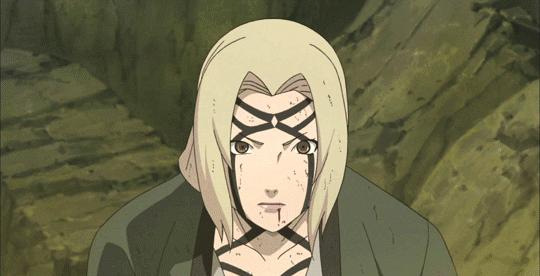
It hurts me to say that Tsunade is the only female character in my list because every other female characters were written in a much more piss poorly way. Only Konan came close to Tsunade but her role was very short.
Despite her character’s purpose revolved around another male character (Dan) and a blatant objectification of her breasts, I liked everything about her other than those mentioned above.
She is the Second Best Hokage who took Konoha right after the destruction made by Orochimaru, excellently handled the aftermath by making friendly relations with Suna (Sand village), provided her best medical support to Konoha in the Pain Arc and successfully handled the fourth Shinobi world war.
She is such a badass who developed her own original jutsu called Byakugou no Jutsu, which can heal herself.
She is just way too amazing and it’s a pity that we got very less scenes in Shippuden.
Best Moments:
Took 25+ stabs from Madara’s Susanoo like a piece of cake (Man, I simply couldn’t describe that scene. All the other Kages were shocked and even Madara too)
Lifted her advisors like a cabbage sack (Those fucking old hags deserved it. Those shits should’ve died)
Her index finger flick assault on Naruto (Aww, Naruto was definitely bratty in his first meeting and Tsunade didn’t hold back at all)
Played Orochimaru like a basketball (In that same arc, she fought Orochimaru mercilessly like a devil left and right. Someone who claimed to have surpassed Tsunade never even dared to fight Orochimaru’s student and crying for his attention after just receiving one stab from Madara. Just saying)
3. Uzumaki Naruto
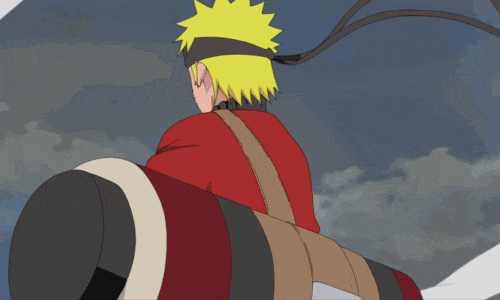
Naruto is the titular character and your emotions evolve along with him. He surely deserves a spot in Top 3. The only reason I didn’t place Naruto even more higher is because he didn’t experience something very important which many characters in this list faced. That is, Losing a loved one before his eyes. Every villain in this series became what they are because they lost someone important before their eyes like Nagato, Obito. (Nope, I don’t count Neji as his loved one). I think this tests the mettle of any character and Naruto failed to experience this. The only person he ever lost was Jiraiya and that too from off-screen. That’s why I felt his journey to his dreams seemed little easier compared to the rest of the characters.
His best block of episodes will always be the part 1 Episode 1, 2, 3. Episode 1 is the character defining episode for Naruto and what he learned there will be applied everywhere till the very end of the series. He learned 3 things
Forgiveness, Empathy and Acceptance
Talk-No-Jutsu
Kage Bunshin no Jutsu
From then on, this boy wins many friends to his side, not only from Konoha but from other villages too and even made them to acknowledge his strength only through his sheer hard work.
However, there is this person, whose acknowledgement he wants the most. That person is his most important bond along with Iruka Sensei. He is none other than Sasuke. One day, Sasuke left him alone for some unavoidable reason at the end of part 1 which left a huge scar in him and he vows to bring him back to the place where he belongs. That becomes his ultimate goal rather than becoming an Hokage.
The way he goes to any extent to protect the people he cares about is just simply entertaining to watch.
Every time he makes an heroic entry to save the day was never boring, not once.
Best Moments:
Sobbing from his heart after hearing Iruka Sensei acknowledging him (It just makes me feel heavy for no reason. The anime team did an awesome job to capture his emotions convincingly)
Awakening Kyuubi Mode for the first time after seeing Sasuke die in his arms (Man, out of all the collective hatred he got from the villagers, this moment affected him a lot speaks volumes)
Punching Neji from the underground to win the Chunin exams (God, I honestly believed Naruto lost but he just surprised us heavily from nowhere. And that failure speech was just pure bliss to watch even today)
Pain Vs Naruto (One of the best arc for Naruto. Because unlike other arcs, where Naruto fought with a team, this arc he was all alone fighting a person with Rinnegan. Be it the exuberant landing from the frogs with a dramatic kabuki music, creating multi-step attacks, coming up with novel solution in that difficult situation, finally ending the conflict without killing the enemy, becoming an hero. Superb journey. The only thing I didn’t like in that arc is some shitty selfish proposal. PUKE!!)
Bearing the burdens of his most important person and die along with him (This boy always shouts he will never die until he becomes an Hokage. But for Sasuke, he was ready to die along with him in order to not leave him alone proves how much he loves him. This shows his emotional maturity rather than shouting at Sasuke like he always did before which never reached his ears. This time it did)
Final Good Bye to Minato (Honestly, I was bawling just like Naruto in that scene no matter how many times I watch it. It started out slow but as he speaks more and more, he simply couldn’t hold back and wept a sea of tears 😭😭😭)
2. Uchiha Sasuke
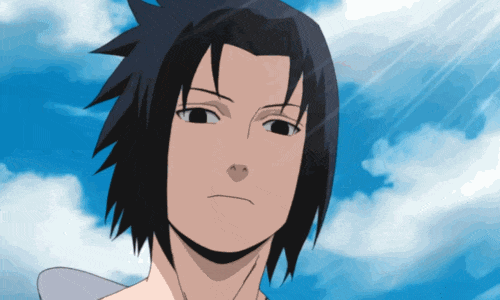
One of the well written characters in this series, with all the flaws and positive stuffs which makes him more of an Anti-Hero. He always subverts my preformed opinions and never ceased to surprise me.
Despite being aloof and cold, his warmer side will always be exposed towards Naruto. This is evident by many things he had done for Naruto which he don’t have to or no reason to. Starting right from roasting Sakura, offering lunch, asking for tips, enquiring about breakfast, protecting him many times and dying for Naruto.
Why I placed him above Naruto is because of his unavoidable decision to tread in a complicated dark path primarily due to the trauma he carried and was stirred up again by collective factors such as Orochimaru’s cursed seal, Itachi’s arrival and Naruto’s growth. Compared to Sasuke, Naruto had an easier path because he never saw anyone die before his eyes and hence he don’t carry any trauma which can divert his path.
Even after watching his entire clan and family members murdered before his eyes at an age 8, he managed to pull himself and never snapped out like many other good characters does. But the moment when he found out that Itachi was good all along, he simply couldn’t tolerate the truth and gave himself to Vengeance. Because, he loved his brother more than he hated him all these years. This shows he loved his brother more than his parents. His resolve to destroy Konoha was perfectly understandable. But is it good? Nope. He can kill Danzo and those old hags but killing other people was never justifiable.
But still, his resolve to have his vengeance was diverted by Naruto and weakened by Itachi, at some point. So, he decided to know the truth and when he heard it, he understood the Hokages also sacrificed many precious things to protect this village just like his Brother Itachi. He understood the mistakes of his clan and decided to protect the village which he swore to destroy. [Many Sasuke fanatics think that he succumbed to the Government and Kishi wrote Sasuke to bootlick them. Their idea was to tackle genocide with another genocide. What a stupid idea!!!!]
And No, I don’t consider him trying to kill Sakura, Karin and Kakashi as his bad moments (though I feel bad for Karin). For the simple reason being, he became a monster by losing himself in the darkness who lost the rationality to differentiate friends from foes. Much similar to how Naruto lost himself to Kyuubi’s hatred against Orochimaru and in Pain Arc. It’s so hypocritical to ignore Naruto and accuse Sasuke here. Plus, Sakura had no business to be there otherwise Sasuke would not have tried to kill her.
But does it mean Sasuke did nothing wrong???
Nope.
He definitely shouldn’t have joined Akatsuki and hunted Killer Bee like an animal. Because, he knew that Tobi was the one who helped Itachi massacre the clan. When fighting Itachi he specifically vowed to kill Madara (Tobi). On top of that, Itachi passed on Amaterasu in his eyes specifically to stay away from Tobi. Why did he ally with him? Plus, Sasuke was one of the few characters who was exposed to the name ‘Akatsuki’ in part 1 itself. He clearly knew that this organization targets Naruto, his closest bond. Why did he join there? This is where the stupid part of Sasuke came out. I was grunting... ‘Oii Where did that clever Sasuke, who faced 1000 soldiers without killing any of them, went??’.
And his plan for Revolution???? I thought it would be reasonable. But his vision was eerily similar to Danzo’s vision. Grrr..... Danzo also wanted to create his ideal village by destroying the current Hokage. He wanted to unite the Five Village and put himself on top of everyone as evident from the Kage Summit arc.
I appreciate him that he finally adopted the Will of Fire, by wanting to protect the village at all costs just like Itachi and Hashirama did. But his methods are not very democratic. Plus, he wanted to do it alone. I was screaming at him... ‘Grrr, Sasuke, did you listen to Itachi at all???. He failed because he did everything alone. Why can’t you understand????’ This is also another instance, Sasuke’s stupidity glanced out.
I am happy Naruto knocked some sense into him by telling him not to do it alone but together.
Many fanatics also ask, ‘What did Sasuke do wrong to atone for his sins at the end?’.
I was like ‘Reallly????’
He joined Akatsuki, an organization which terrorized all the 5 villages and he hunted someone like an international criminal.
He spoiled the Kage Summit and attacked Raikage who lost his arm because of him. I know what happened over there is not Sasuke’s fault. But these are the kages who was loved by many people in their own villages. How can the world forget it and simply let him go?
It’s exactly because of all those lovely stuffs he did in Part 1 and all these mistakes he did in Part 2 but willing to correct his mistakes by sharing the burdens of his other half in the end made him more interesting, complicated and exciting and that’s why I love this character.
I also have a personal bias to love this character sooo much because of the character on top of my list.
Best Moments:
Defending Naruto before Sakura (Awww!!! Such a good boy he was. Eventhough I thought he was a typical arrogant K-Drama hero, he just subverted my opinion in that one scene. I always have a thing for people who stands up for someone even though they don’t have to. This is where I started to like Sasuke)
My body moved on its own. (Is there anything that trumps this scene in terms of emotions and love in this series?. This moment is where I understood the depth of Sasuke’s emotions towards Naruto).
What is a Clan? What is a Village? What is a Shinobi? (I was really hoping for Sasuke to question himself something similar to this. Because he was so self-absorbed in his hatred and failed to look outside him ever since he left the village. It was so gratifying that he did that)
Killing Orochimaru (I always thought Sasuke will kill him only after he tries to take over the body. Never imagined that he will strike the snake first)
Killing Danzo (Man, what an amazing battle!!!. It was so gratifying to see such a crass bastard die many times over and over).
His dramatic confession through his monologue (After the mystery of Who is this Tobi, Sasuke’s obsession towards Naruto remained a mystery for me. Why did he listen to Naruto under the bridge? Why did he protected Naruto in the War? I got the answer only after this confession. It was so heartwarming to see this mellow side of Sasuke)
1. Uchiha Itachi
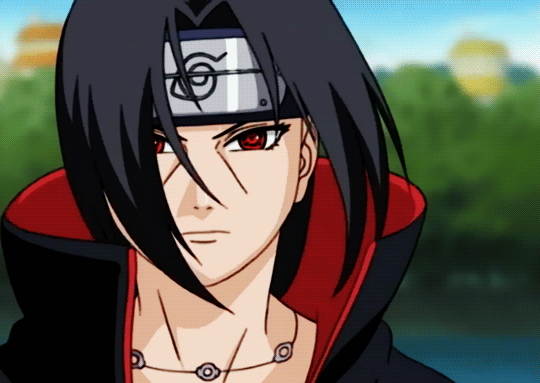
I could write pages about him. The foremost reason I like Itachi and earns the top spot in my rankings is because he shockingly resembled me in many ways. As I already said, I come from a place where clan politics plays a major role and when I see Sasuke’s flashback in part 1, I was simply dumbstruck by such a detailed similarities.
Elder child of the family - ✅
Have an adorable younger sister who loves me more than my parents - ✅
Same age gap (5 years) with my sister as Itachi and Sasuke - ✅
Parents paying total attention on me while ignoring my sister completely - ✅
Parents constantly comparing my achievements with my sister - ✅
A sister who bear hugged me every time I entered the home after returning from my school - ✅
Despite my mom being a teacher, my sister always prefers me to teach her stuffs as she considers me to be way too better than my mom - ✅
Love my sister more than my parents - ✅
Clan-Obsessed parents - ✅
Used me as a tool for the benefit of the clan - ✅
Sending another person from my clan to spy on me - ✅
Strained relationship with my parents - ✅
Disgusted with my clan - ✅
Most importantly, this dialogue from part 1 episode 129,
Clan? Clan?
Obsessed with the organization, Obsessed with the clan, Obsessed with the name, that’s merely the detestable action that restrict yourself.
I have given up all hope in this worthless clan
Because, people obsess themselves to their clan, a thing so petty, they lose sight of the things that are truly important.
A real change cannot occur under restraints and controls
I confronted my parents with the exact same dialogue (almost 98% similar) in my own native language some years ago.
I didn’t even know the existence of Naruto series at that time. I was simply shell-shocked by all these similarities with this character.
And Yes, The moment I heard these dialogues, I knew Itachi, was a good guy, who had a very strong reason for his actions and I instantly knew Sasuke’s revenge will not bear him any happiness.
It is exactly because of all these striking similarities of myself with Itachi, and my lil’l sister with Sasuke, my family dynamics with the Uchiha family.... I could understand the magnitude of Sasuke’s love towards Itachi.
And precisely because of that, I could understand Sasuke’s love towards Naruto is not fucking ‘brotherly’ one but something that leans towards Attraction.
No wonder, Itachi left Sasuke in Naruto’s care.
Anyways to speak objectively,
Itachi is an extremely self-sacrificial person whose life is full of pain and miseries but never blames it on the world unlike other Uchiha members like Madara, Obito and Sasuke to an extent.
He did things considering the bigger picture which never benefitted himself in anyway and was willing to go to any extent even at the expense of his own family and his brother’s happiness. That is, Uchiha Clan Massacre and Joining Akatsuki. None of this benefitted him in anyways but he did it anyway, for the village of Konoha.
His ideals are shockingly similar to Hashirama, Which Sasuke pointed this out and Hashirama acknowledged that Itachi was a better shinobi than he was. ❤️❤️❤️
Now, does this means I support Uchiha clan massacre?
No way. Even Itachi didn’t.
This massacre happened because of the huge clusterfuck from Hiruzen’s incompetence, Danzo’s paranoid arrogance, Uchiha clan’s devious plan to over throw the government by force rather than approaching it in a peaceful way, say, a peace talk or a protest.
All these people acted on their own self-interest. Itachi and Shisui caught in their whirlpool, bear their burdens and paid for it with their life. Sasuke suffered for it.
But, it’s not the only reason I love this character. It’s because, the moment he decided to massacre everyone, he marked his own death by the hands of his beloved brother. I love people who owns up their mistakes and face the consequences rather than making excuses (even though it’s not entirely his mistake).
Itachi is also the only character in this series who realized his failures on his own without anyone’s interference or Naruto’s Talk-No-Jutsu.
And he apologized for everything he did to Sasuke.
Again, some hardcore Sasuke fanatics criticize/hate him for torturing their poor ‘Sasuke-Kun’ with his Tsukuyomi. I was like ‘Hmmm...What?’.
First off, Itachi apologized to Sasuke for not thinking out from his point of view and also for not telling him the truth earlier.
Second off, Sasuke never even blamed Itachi for anything (even he didn’t hold him for killing their parents). If Sasuke himself, forgiven Itachi... Why are his fans being so rabid?
Third off, for all of his supposed ‘crimes’, he paid for it by dying as a disgraceful Madman rather than a Hero who really saved the village. He is someone who should be celebrated like Naruto but instead died proudly as a Traitor of Konoha.
All in all, One of the wonderfully written character I have ever seen in the media.
Best Moments:
Itachi vs Sasuke (That battle was a pure brilliance and highly emotional especially after knowing the truth. When Sasuke released his Kirin, Itachi showed off his ultimate armour Susanoo like a badass. Seeing Susanoo for the first time gave me chills. No, Sasuke didn’t kill him. Itachi died on his own)
Itachi vs Orochimaru (Man, Itachi may look mellow but when it comes to Orochimaru he is a pure Sass. He screwed that snake up both the times by a wide margin. It seems Uchiha brothers like to fuck up Orochimaru, LOL)
Talk-No-Jutsu’ing Naruto (Geez, Naruto was being completely bratty and was full of saviour complex like he was going to bear everyone’s hatred by himself. I was almost annoyed. Thanks to Itachi, he realised. Probably he is the only character to shut Naruto using his own jutsu)
Izanami’ing Kabuto (Other than Naruto, he is the only character to go out of his way to empathize with a villain and put extreme effort to change him. I think this is why Sasuke loves Naruto, for seeing these similarities??? ).
Goodbye to Sasuke (The first time when he said ‘Forgive me, Sasuke. This is the last’ by poking his forehead and finally closing the distance by butting with Sasuke’s head softly saying ‘I will love you always’.... It always evokes uncontrollable tears in me, no matter how many times I watch it 😭😭😭😭😭😭😭)
HONOURABLE MENTION
Uchiha Obito
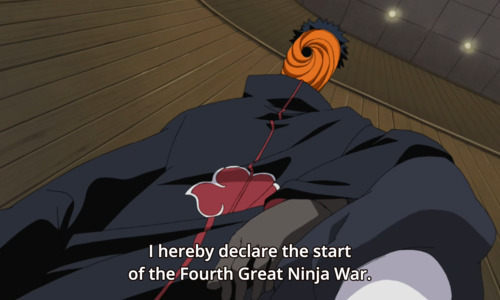
God, Am such a sucker for Uchiha guys individually, though collectively as a clan they fucked up big time. I simply couldn’t find the place for him in the top 10. He is a classic example of What Naruto will be like if he becomes a villain?
However, all those horrible stuffs he did just for a girl whom he had a crush on which was never reciprocated seems childish. That’s why I couldn’t put him in Top 10.
And his understandable but weird obsession on Naruto was always enjoyable to watch.
One cute thing I liked about him was, whatever criminal stuffs he may have done, he was never a cheapskate though. He had every chance to take back Kakashi’s Sharingan to activate his own Susanoo. But he never even thought of such an idea. He was a bad guy. But a good friend, no matter what.
Pure Baby!!! But lost his way!!!
Best Moments:
Importance of Team Work (’In the ninja world, Those who break the rules are scum. But those who abandon their comrades are worse than scum’. This very legacy he left to Kakashi came to defeat him later. And Naruto follows this motto even today)
Sacrificing his Sharingan (’I am giving you my Sharingan. No matter what the villagers say, you are a great Jonin. Please take it’. Awww!!! Obito. He left his Sharingan which helped Kakashi to complete a jutsu called ‘Chidori’, which is a go-to jutsu of Sasuke)
Thanks for the ask, anon. I thoroughly enjoyed writing this. ❤️
#ask#itachi#itachi uchiha#sasuke#sasuke uchiha#naruto#naruto uzumaki#hashirama#tobirama#hashirama senju#tobirama senju#madara uchiha#madara#killer bee#kakashi#jiraiya#tsunade#obito#obito uchiha
128 notes
·
View notes